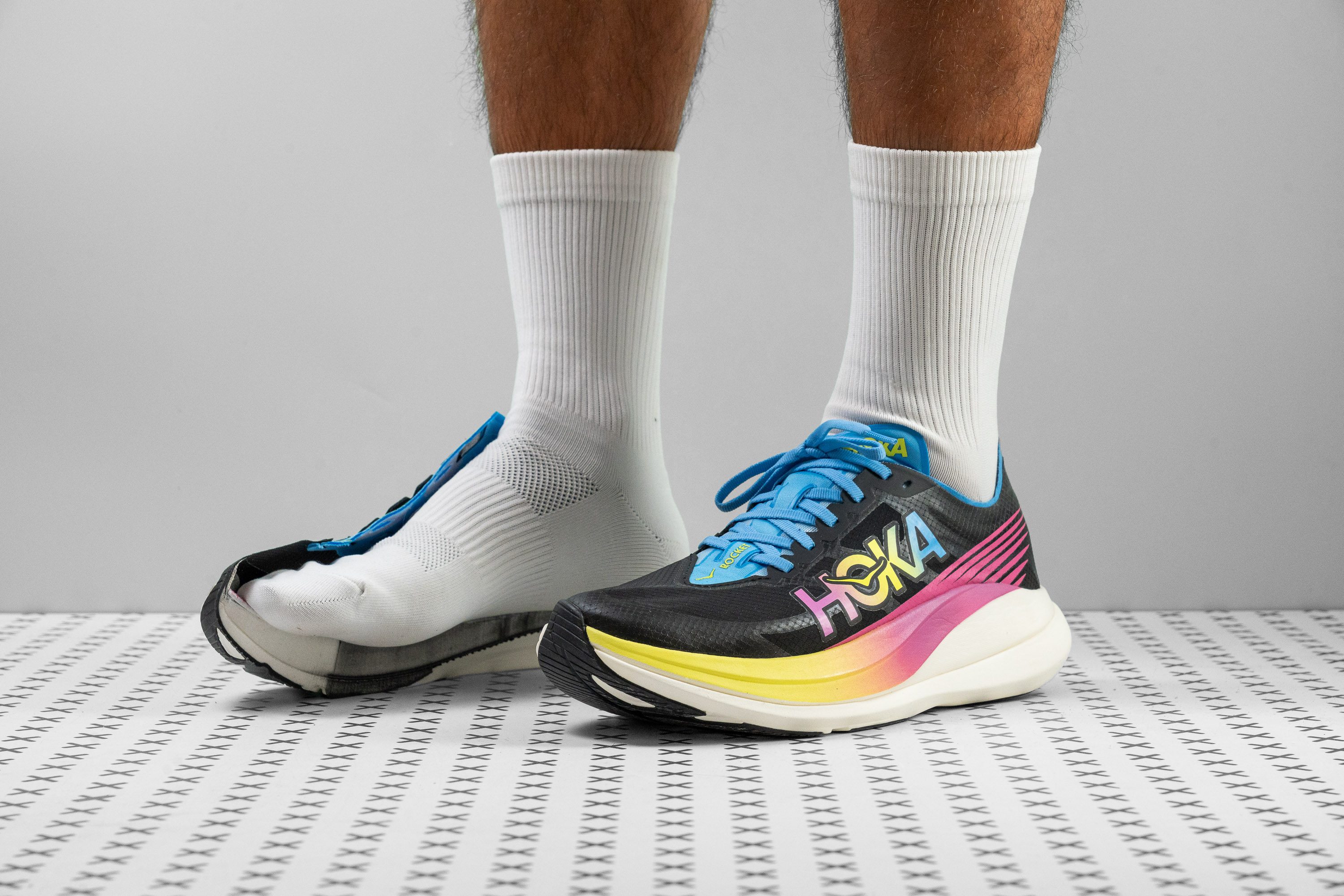Our verdict
- Top pick in best Running shoes for 5K and 10K races
Pros
- Ultra-responsive PEBA foam
- Long-lasting outsole with extensive heel coverage
- Maximum cushioning
- Superb energy return
- Remarkably stable
- Suitable for all foot strike types
- Excellent traction
- Fantastic rocker geometry
Cons
- Bloody narrow toebox
- Heavier than the competition
Audience verdict
Comparison
The most similar running shoes compared
+ + Add a shoe | |||||
|---|---|---|---|---|---|
| Audience score | 86 Good! | 90 Superb! | 90 Superb! | 90 Superb! | |
| Price | £220 | £285 | £195 | £280 | |
| Pace | Competition | Competition | CompetitionTempo | Competition | |
| Arch support | Neutral | Neutral | Neutral | Neutral | |
| Weight lab Weight brand | 7.7 oz / 218g 7.9 oz / 224g | 7.1 oz / 201g 7 oz / 198g | 7.2 oz / 204g 7.4 oz / 209g | 7.2 oz / 203g 7.2 oz / 204g | |
| Lightweight | ✓ | ✓ | ✓ | ✓ | |
| Drop lab Drop brand | 6.6 mm 5.0 mm | 8.5 mm 8.0 mm | 10.6 mm 8.0 mm | 8.0 mm 8.0 mm | |
| Strike pattern | Mid/forefoot | HeelMid/forefoot | HeelMid/forefoot | HeelMid/forefoot | |
| Size | Slightly small | Slightly small | True to size | True to size | |
| Midsole softness | Soft | Soft | Soft | Soft | |
| Difference in midsole softness in cold | Small | Small | Normal | Small | |
| Toebox durability | Bad | Bad | Bad | Bad | |
| Heel padding durability | Good | Good | Good | Good | |
| Outsole durability | Good | Bad | Decent | Good | |
| Breathability | Moderate | Breathable | Moderate | Breathable | |
| Toebox width at the widest part | Narrow | Medium | Medium | Medium | |
| Toebox width at the big toe | Narrow | Medium | Narrow | Medium | |
| Stiffness | Stiff | Stiff | Stiff | Stiff | |
| Difference in stiffness in cold | Small | Small | Small | Small | |
| Torsional rigidity | Stiff | Stiff | Stiff | Stiff | |
| Heel counter stiffness | Flexible | Flexible | Flexible | Flexible | |
| Plate | Carbon plate | Carbon plate | Carbon plate | Carbon plate | |
| Rocker | ✓ | ✓ | ✓ | ✓ | |
| Heel lab Heel brand | 37.7 mm 36.0 mm | 38.1 mm 40.0 mm | 39.2 mm 40.0 mm | 39.9 mm 40.0 mm | |
| Forefoot lab Forefoot brand | 31.1 mm 31.0 mm | 29.6 mm 32.0 mm | 28.6 mm 32.0 mm | 31.9 mm 32.0 mm | |
| Widths available | Normal | Normal | Normal | Normal | |
| Orthotic friendly | ✓ | ✗ | ✓ | ✓ | |
| Season | All seasons | SummerAll seasons | All seasons | SummerAll seasons | |
| Removable insole | ✓ | ✗ | ✓ | ✓ | |
| Ranking | #184 Bottom 42% | #61 Top 20% | #35 Top 11% | #45 Top 15% | |
| Popularity | #199 Bottom 37% | #14 Top 5% | #42 Top 14% | #76 Top 24% |
Who should buy
In our view, the Hoka Rocket X 2 is a match for:
- Runners with narrow feet still searching for that just-right racing shoe fit.
- Those looking for a versatile racing shoe suitable for distances ranging from a mile to a marathon.
- Die-hard Hoka fans who've been exploring other brands for a racing shoe due to the absence of PEBA foam. With this release, it's time to get back home!
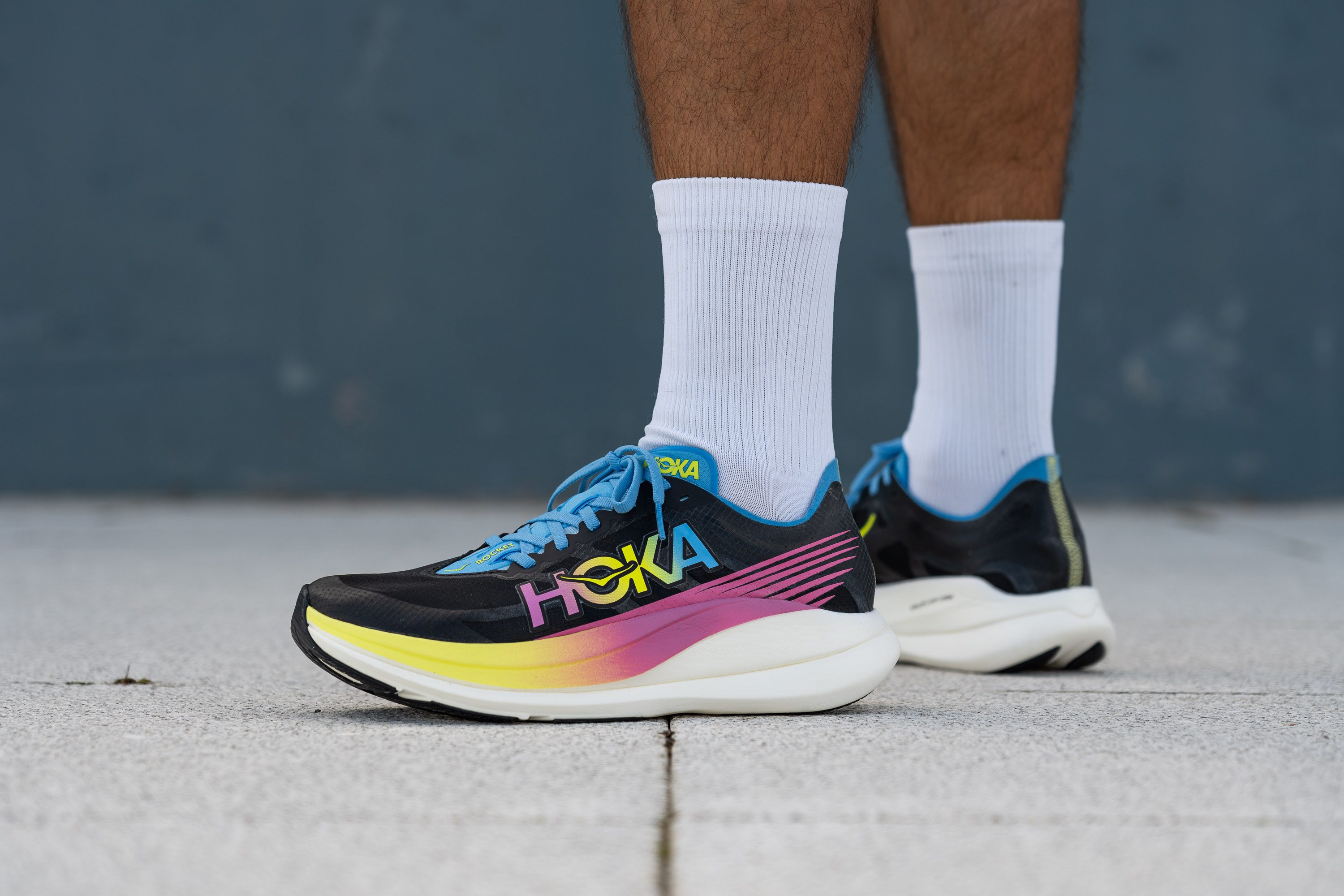
Who should NOT buy
If you have wide feet, the Rocket X 2 might not be the right choice for you—even if you consider going up a full size. We found that there are other top-notch racing shoes out there, like the Adidas Adizero Adios Pro 3 or the ASICS Metaspeed Edge+, which will be a better fit.
Additionally, runners who are on the hunt for the absolute lightest racing shoe might want to look elsewhere, as we noted the Rocket X 2 is on the heavier side.
For comparison, the Nike Vaporfly 2 delivers similar cushioning and Pebax foam but comes in a much lighter package.
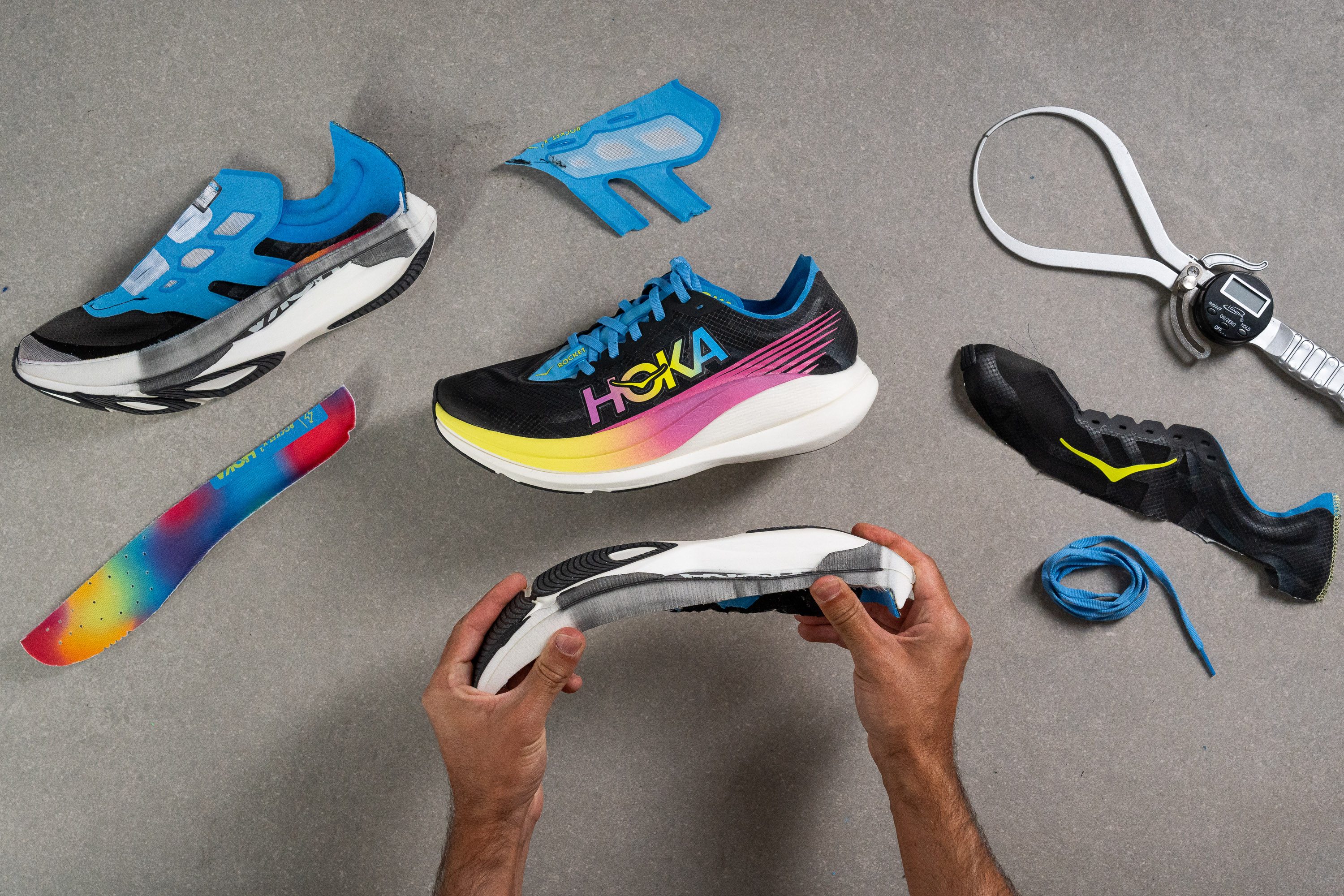
Cushioning
Heel stack
We found that the heel has a generous 37.7 mm of foam. This comes close to the 40-mm maximum set by World Athletics.
It also meets our expectations and offers confidence that our legs will be well-supported throughout a full marathon.
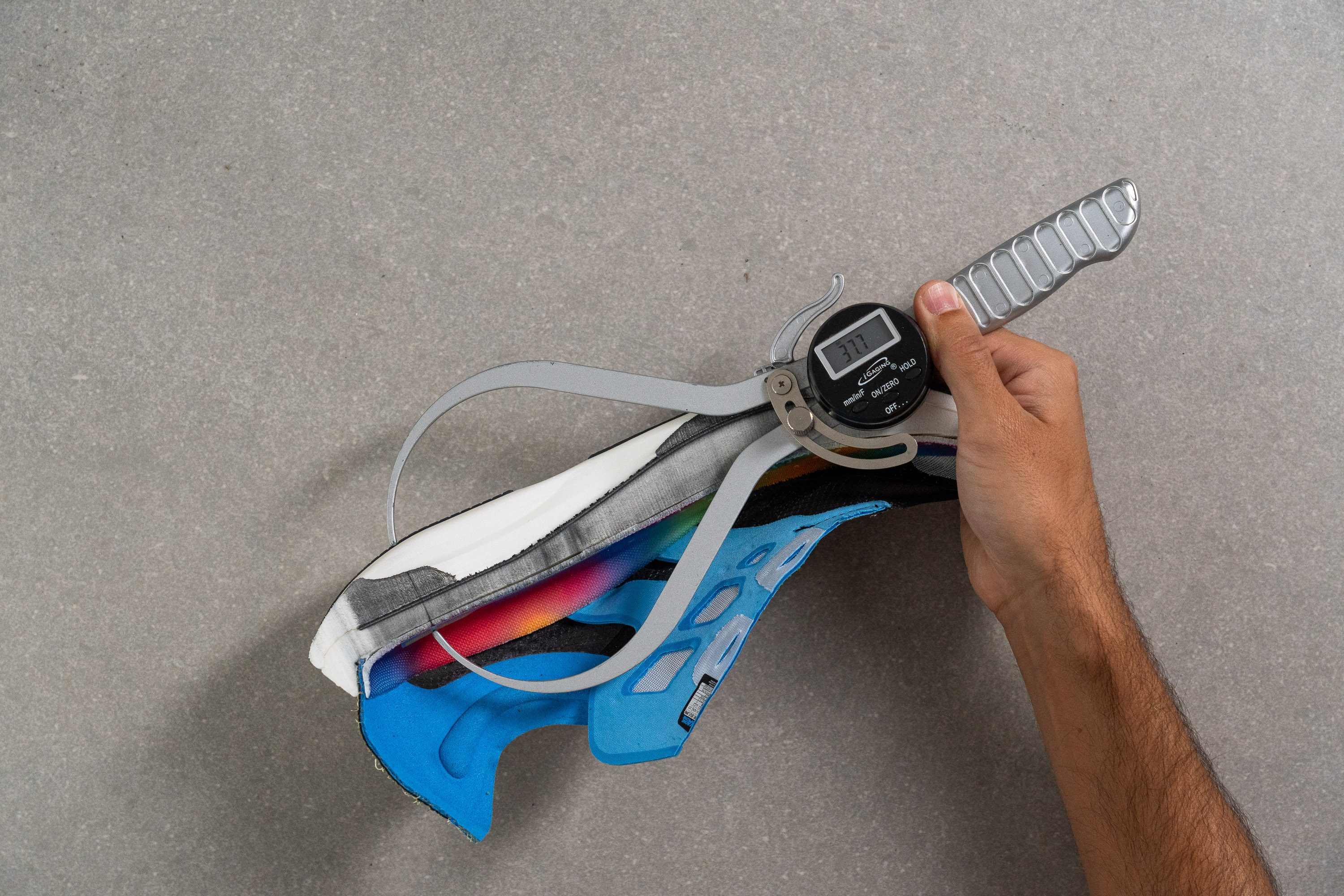
| Hoka Rocket X 2 | 37.7 mm |
| Average | 34.2 mm |
Forefoot stack
We moved to the forefoot and found it to be slightly above the 30-mm mark, coming in at 31.1 mm. This is crucial for both forefoot and midfoot strikers who need cushion in this area.
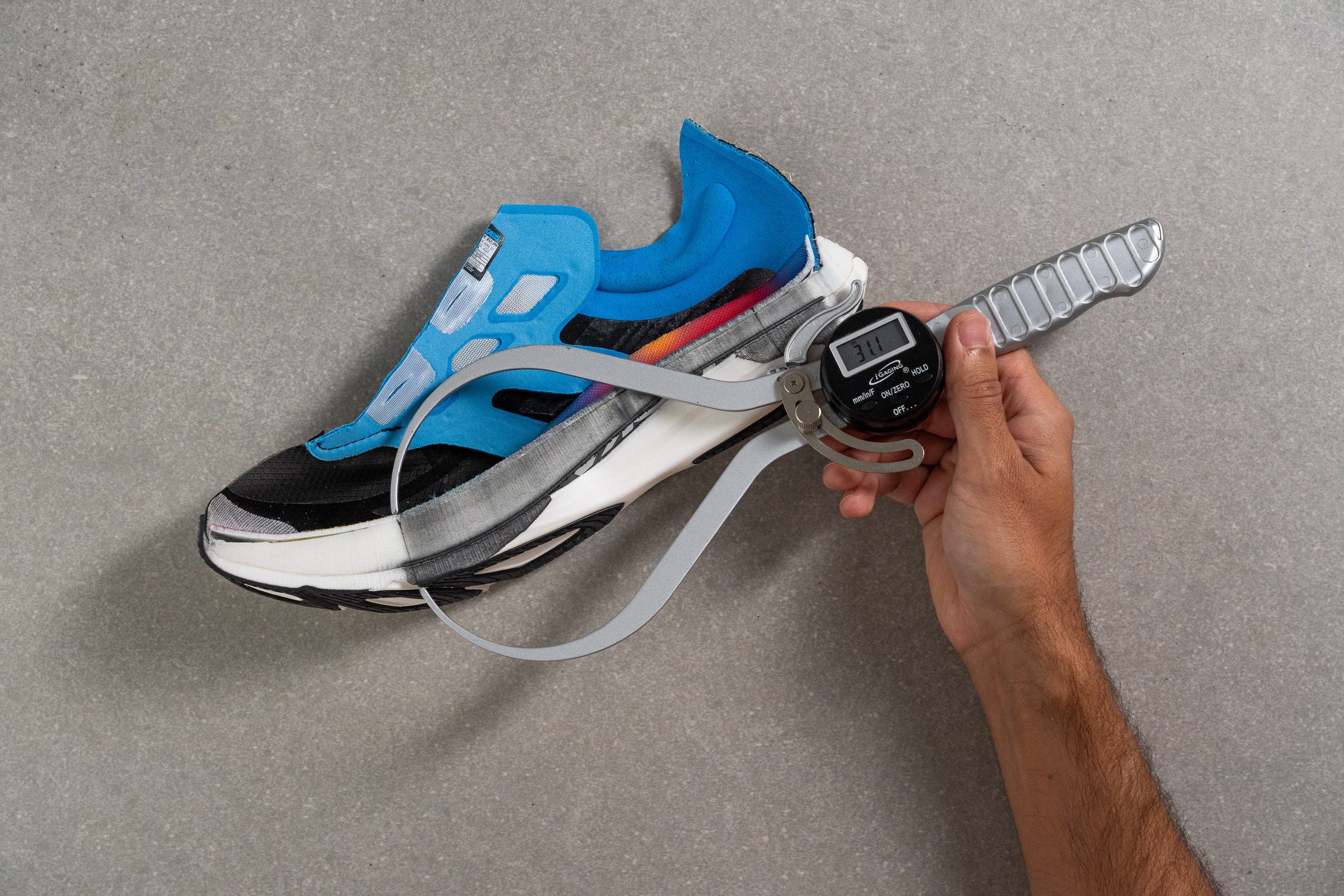
| Hoka Rocket X 2 | 31.1 mm |
| Average | 25.7 mm |
Drop
Based on the two measurements we took in the lab, we discovered that the shoe has an actual drop of 6.6 mm.
This offers a well-rounded balance suitable for all types of foot strikes. Interestingly, there's a slight discrepancy with Hoka's own specs—they list it as a 5-mm shoe. So, they're close, but not quite right!
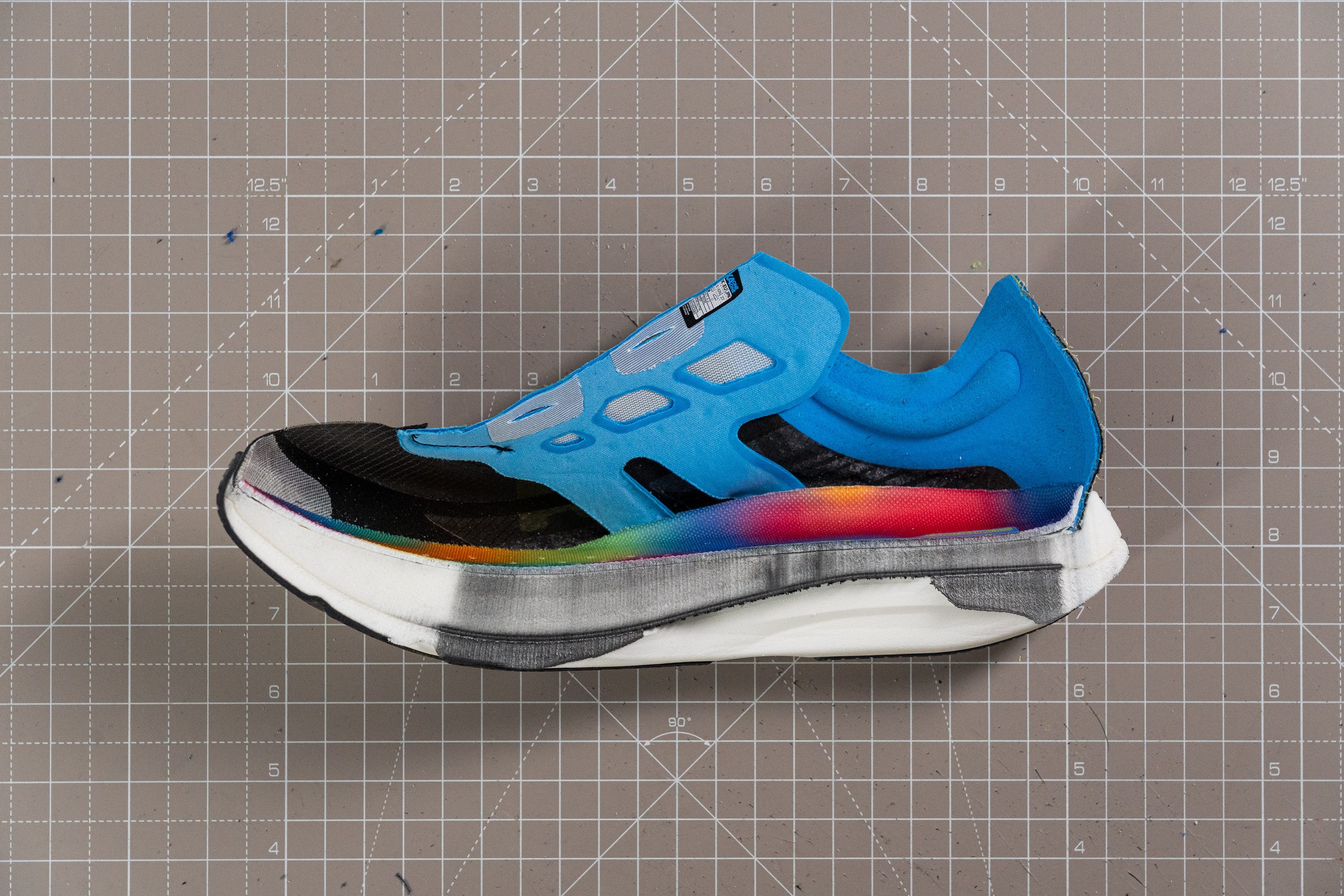
| Hoka Rocket X 2 | 6.6 mm |
| Average | 8.6 mm |
Midsole softness
Moving on to the midsole—Hoka has made a significant change. They've shifted away from their old EVA-based foam and introduced a top-tier, high-performance PEBA foam that offers excellent energy return.
When it came to testing the softness of this material, we clocked it at 17.4 HA. While it's soft, it's not crazy plush. This ensures a responsive and springy ride without giving us the sensation that our feet are sinking into the shoe.
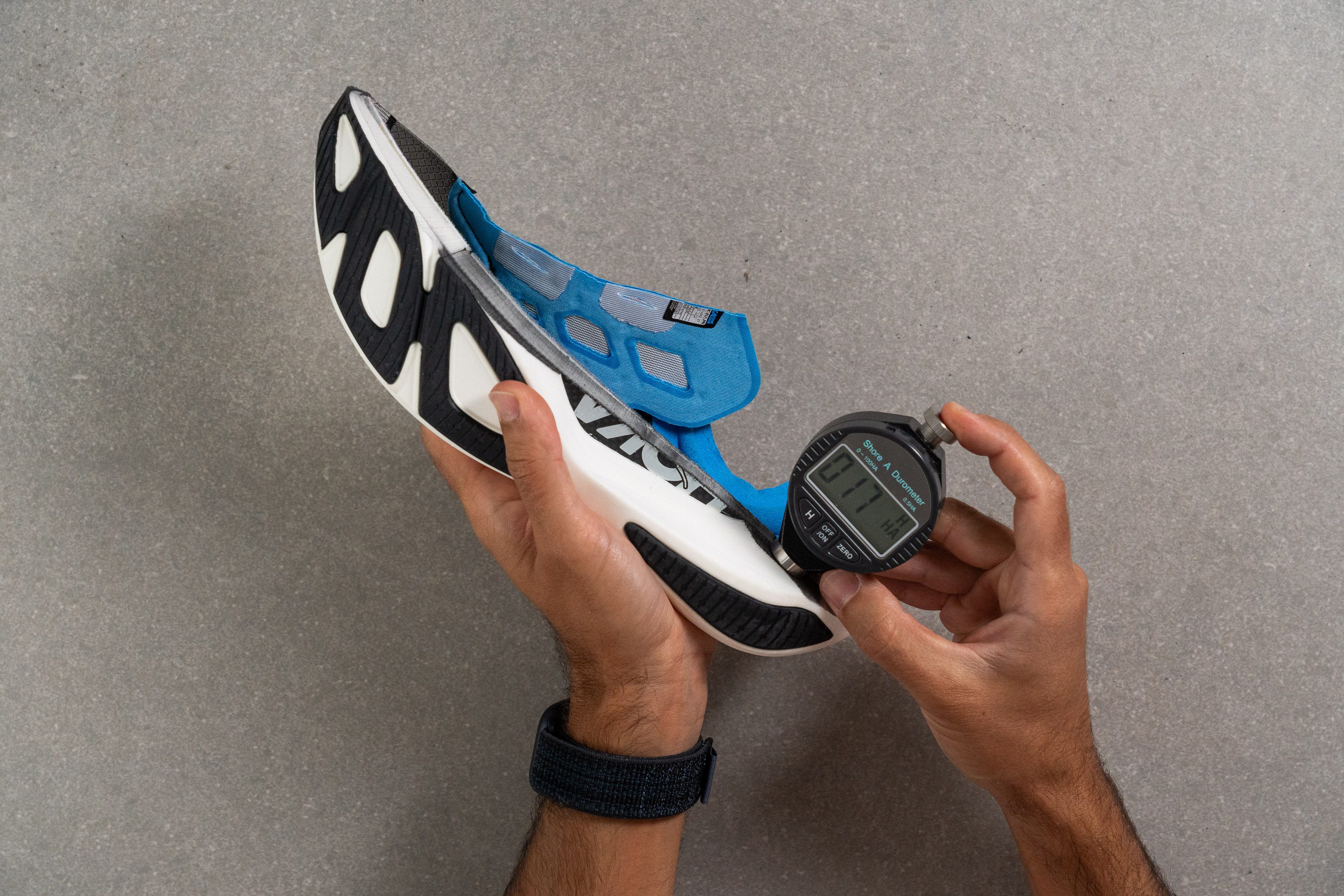
| Hoka Rocket X 2 | 17.4 HA |
| Average | 20.9 HA |
Midsole softness in cold (%)
To see how the new PEBA foam performs in colder conditions, we placed the shoe in the freezer for 20 minutes and then took new measurements.
We found that it did become slightly firmer, measuring up to 20.0 HA.
With an impressive 15.1%, this shoe ranks among the top-performing running shoes in this test. Indeed, the PEBA midsole delivered!
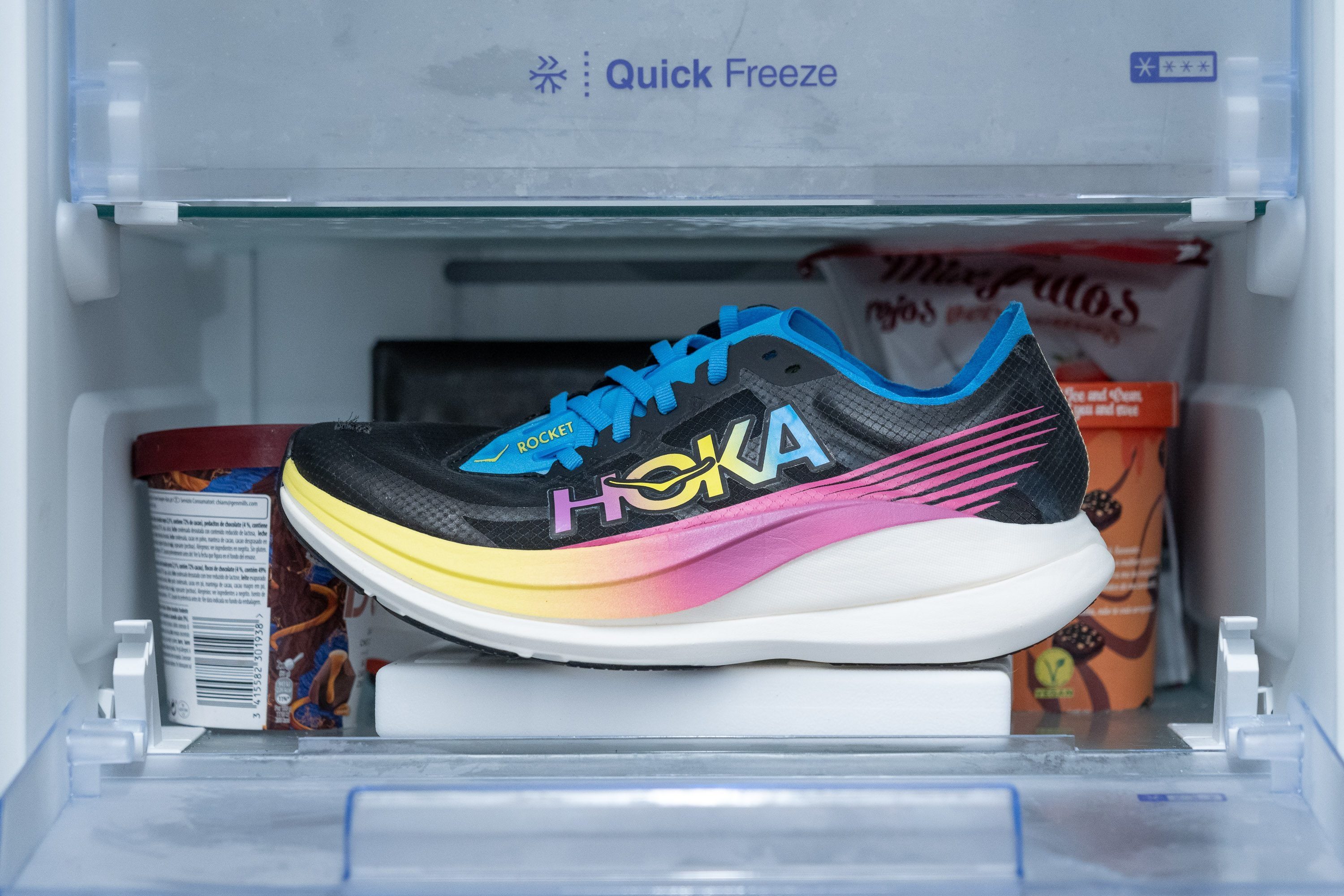
| Hoka Rocket X 2 | 15% |
| Average | 25% |
Insole thickness
In our lab, we found that the insole is among the thinnest we've ever measured, coming in at 2.5 mm. But that's not an issue.
In fact, it's a benefit—the thinner the insole, the more bouncy midsole you get!
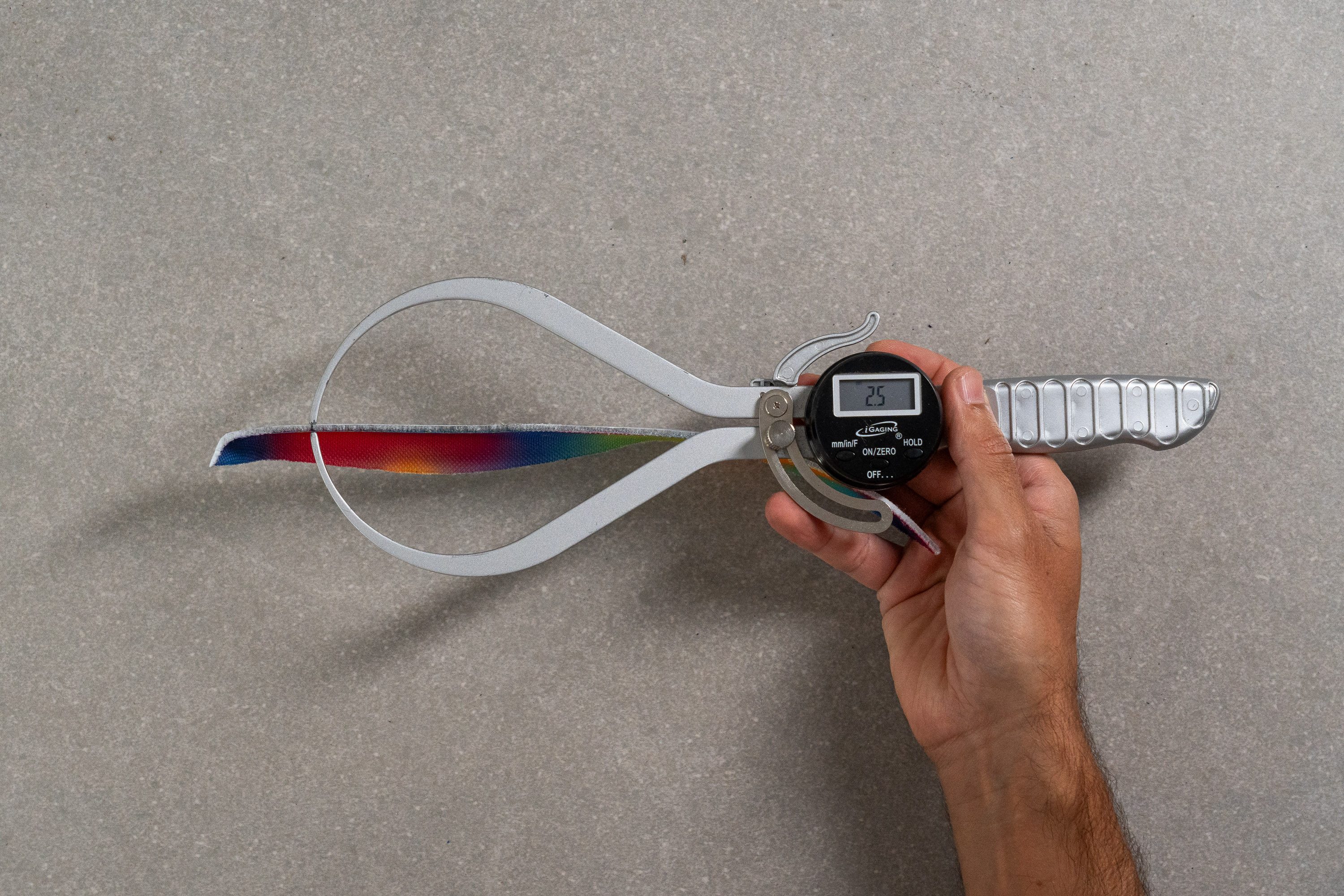
| Hoka Rocket X 2 | 2.5 mm |
| Average | 4.5 mm |
Size and fit
Size
Hoka Rocket X 2 is slightly small (30 votes).
Toebox width - widest part
We measured our gel mould at 88.5 mm, confirming the Rocket X 2's snug design. This didn’t surprise us, as Hoka often creates small toeboxes, and this is a performance-driven supershoe.
Then, it's simple—this shoe really caters to those with narrow feet. If your feet are of medium width, consider going half a size up. Meanwhile, individuals with wider feet might want to look at other options like the Nike Alphafly 3.
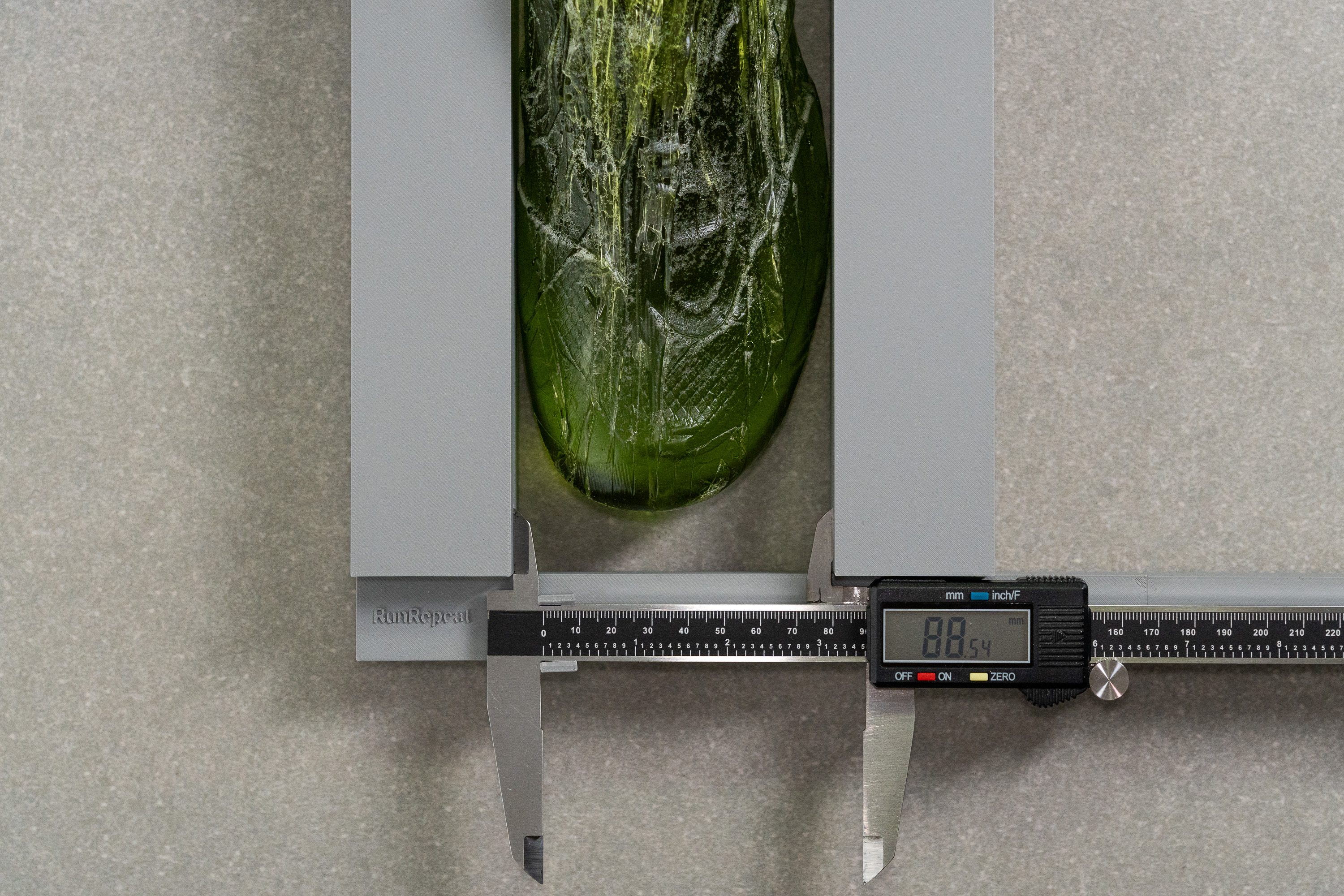
| Hoka Rocket X 2 | 88.5 mm |
| Average | 95.4 mm |
Toebox width - big toe
The big toe area is still slightly narrower than what we usually see in the lab, even on racing shoes. We measured it at 70.8 mm, which is a strong taper but doesn’t seem crazy significant compared to the previous measurement.
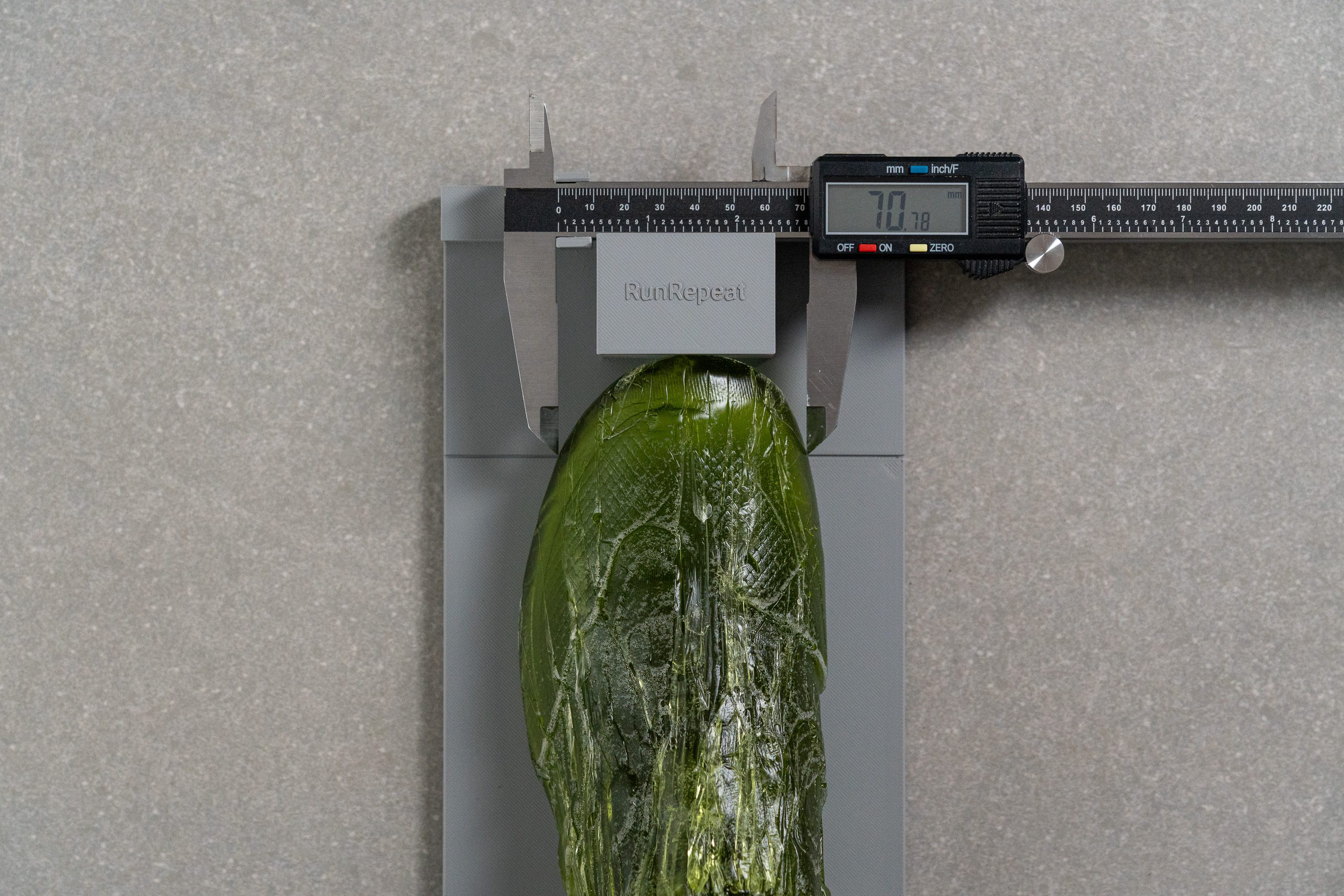
| Hoka Rocket X 2 | 70.8 mm |
| Average | 73.6 mm |
Toebox height
In our experience, the vertical space for the toes was surprisingly generous, and that's great news for those who love highly-accommodating uppers. But at the same time, we believe this could be a drawback for fans of ultra-snug, race-ready designs.
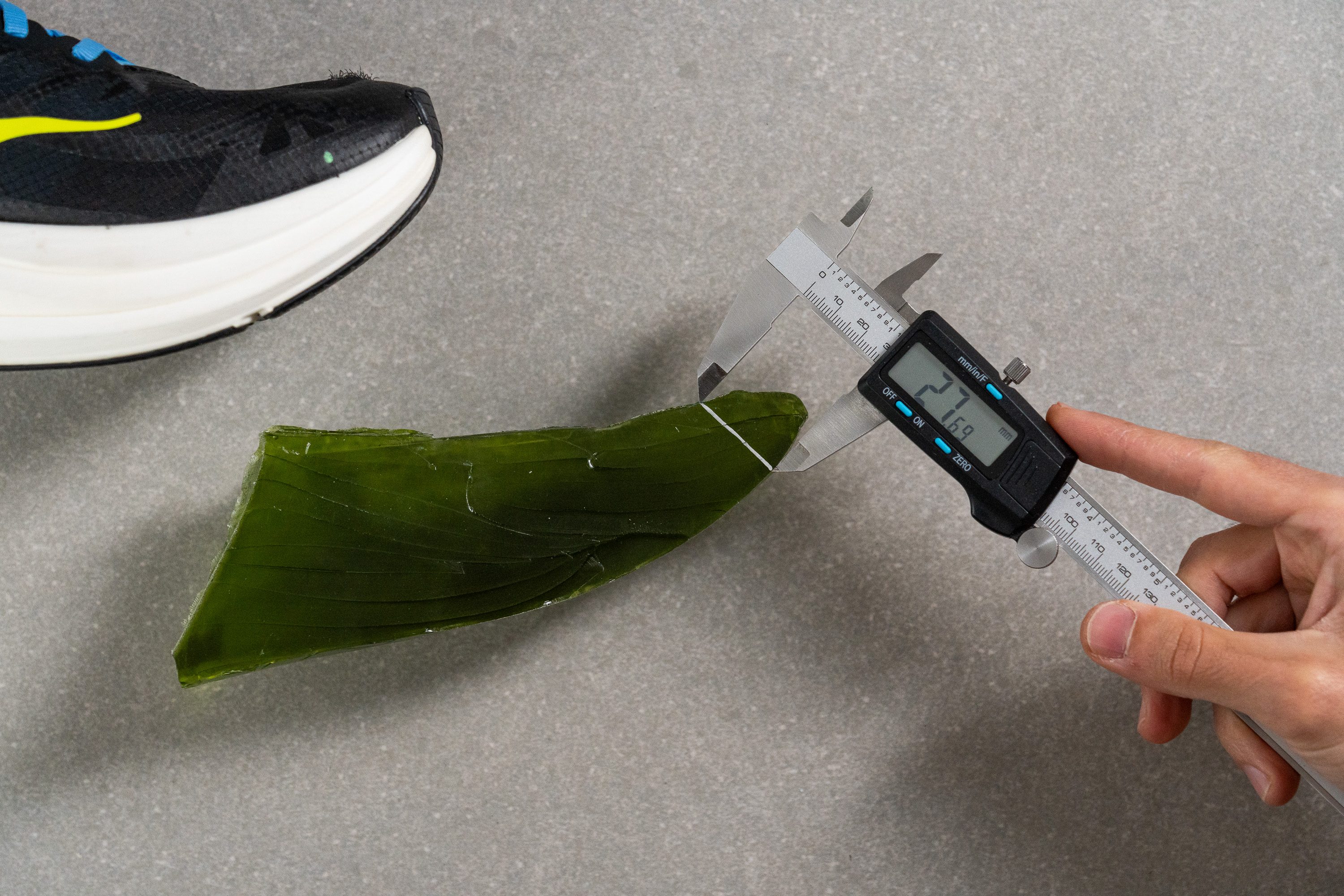
| Hoka Rocket X 2 | 27.7 mm |
| Average | 27.2 mm |
Stability
Lateral stability test
While supershoes are typically unstable, this Hoka offers a reasonably stable experience, even at easy paces.
We discovered that the stability comes from a clever design element. The Rocket X 2 has a insole with walls, making us feel as though we're inside the shoe, not just standing on it. Like the bucket seats in a Porsche!
Torsional rigidity
With a carbon plate sandwiched between the two layers of PEBA foam, we naturally anticipated a 5/5 score in the torsional rigidity test. That's just what we got.
| Hoka Rocket X 2 | 5 |
| Average | 3.4 |
Heel counter stiffness
The absence of structure in the heel results in a 1/5 stiffness rating in that area—yet we haven't noticed any heel-slippage at all.
| Hoka Rocket X 2 | 1 |
| Average | 2.9 |
Midsole width - forefoot
At 113.3 mm, the midsole is similar in width to everyday trainers, like the Hoka Clifton 9.
We found that this design provides comfortable landings and adds to the shoe's stability. This is in contrast to some speed-oriented shoes that can be too narrow and feel more wobbly.
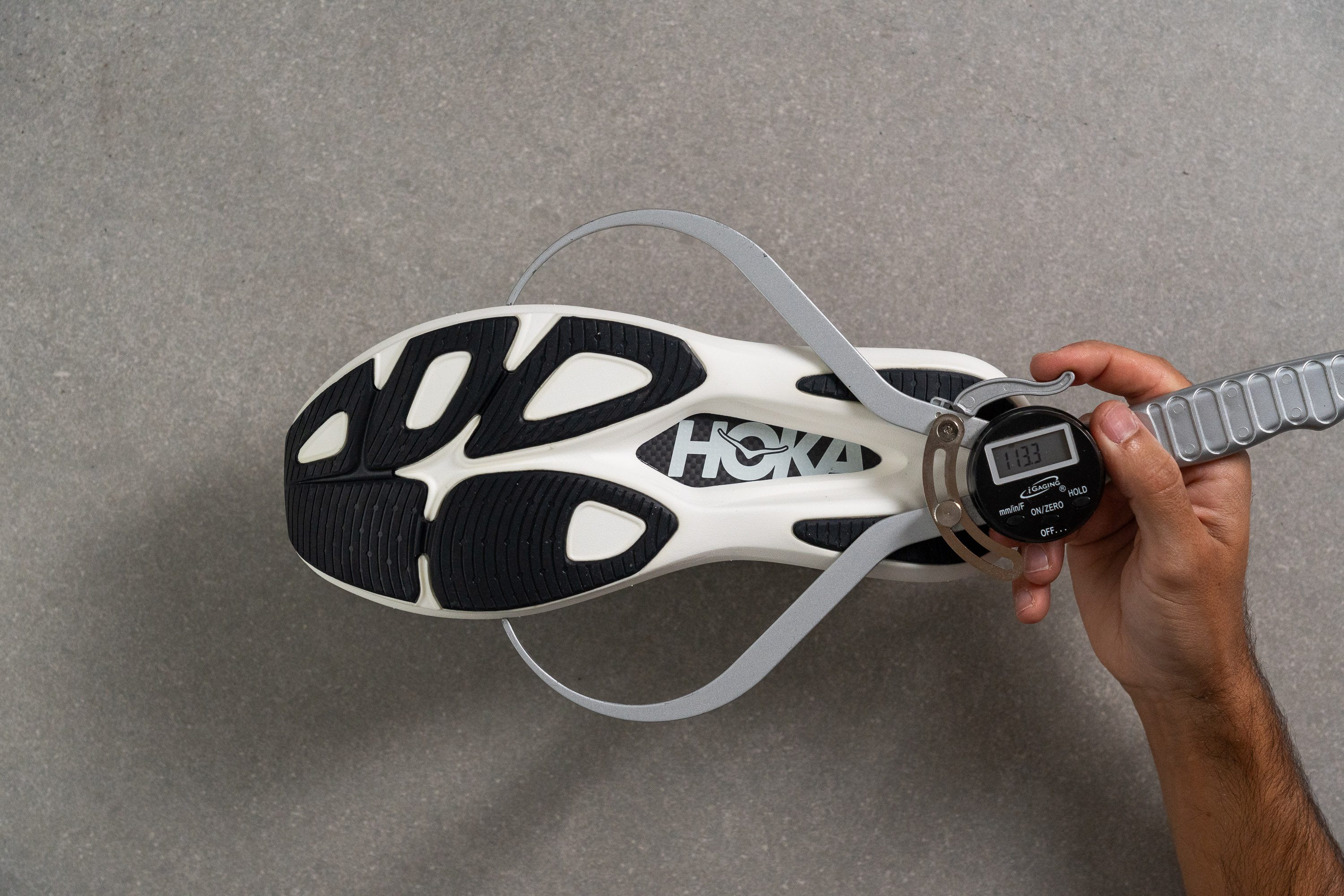
| Hoka Rocket X 2 | 113.3 mm |
| Average | 114.2 mm |
Midsole width - heel
The story is different when we look at the heel. Measuring at 85.2 mm, it's on the narrower side.
We discovered that extreme heel strikers might prefer something wider in this area like the Hoka Carbon X 3. While it doesn't have the bouncy foam, it offers more stability for them.
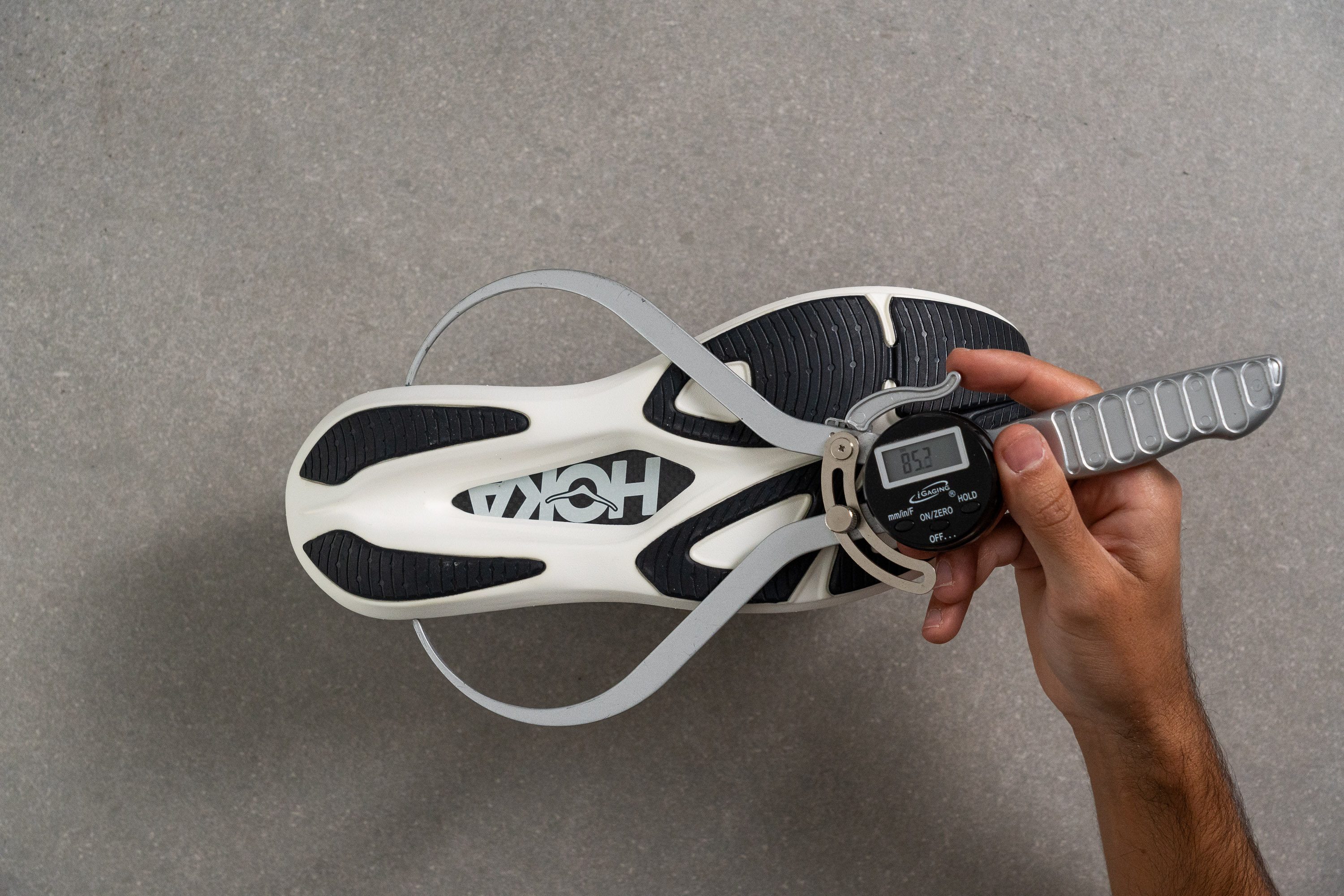
| Hoka Rocket X 2 | 85.2 mm |
| Average | 90.7 mm |
Flexibility / Stiffness
The Rocket X 2 is STIFF. In our 90-degree bend test, we measured a result of 80.7N, making it one of the stiffest shoes we've ever tested in the lab.
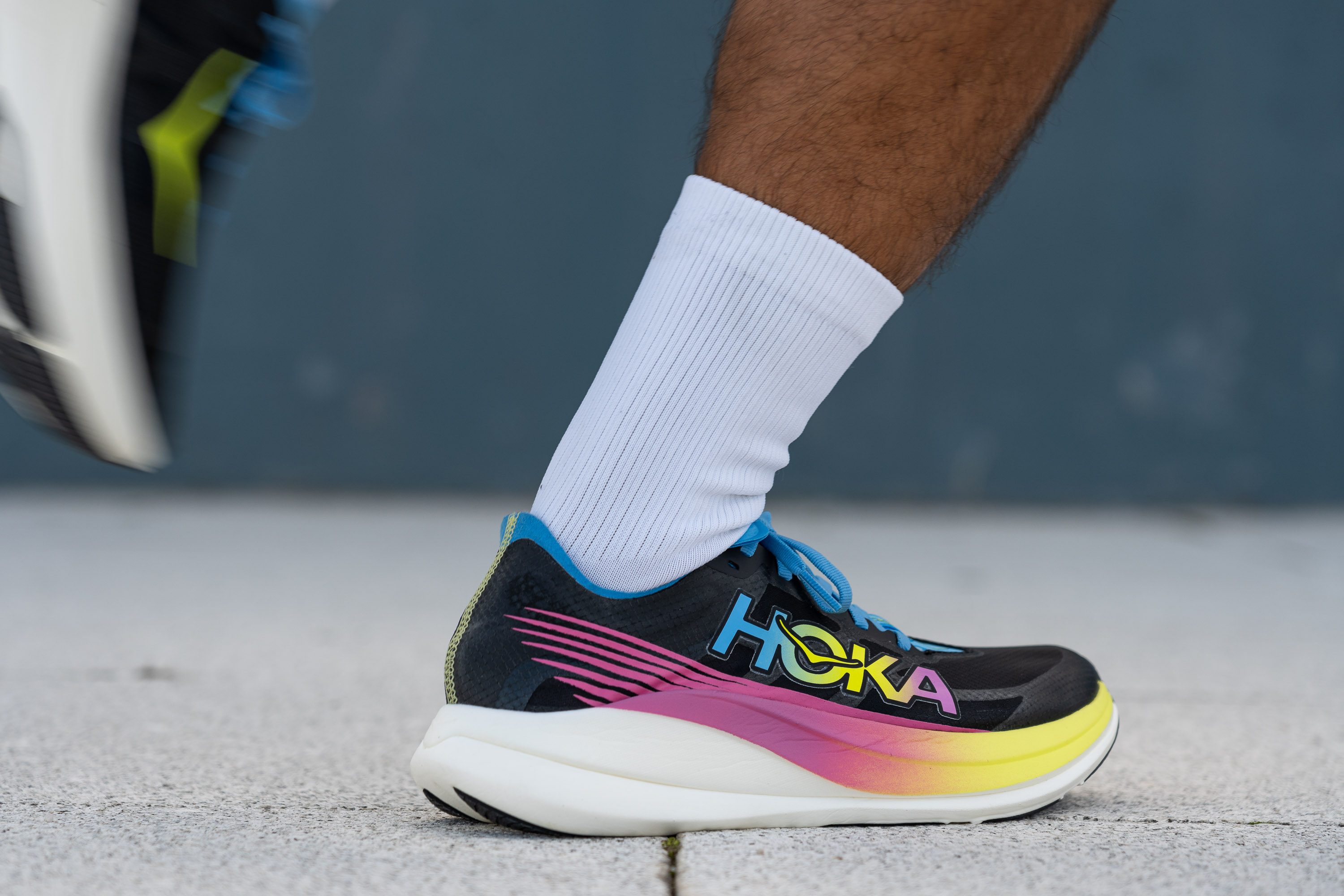
This level of stiffness can be fantastic for snappiness and a springy ride—just what many runners seek in races. However, we found that it might be a bit much for some. If you find this level of stiffness uncomfortable, perhaps a non-plated max-performance shoe like the ASICS Superblast would be a better fit.
This shoe follows methodology 1.8. It has been replaced with methodology 1.8 (the 'gel test') on more recently updated shoes. Results from the two methodologies cannot be directly compared.
| Hoka Rocket X 2 | 80.7N |
| Average | 28.1N |
Stiffness in cold (%)
After putting the shoe in the freezer for 20 minutes, we conducted the stiffness test again in our lab. We measured a result of 90.0N.
The result closely mirrors our room-temperature test.
This top-notch outcome is solely due to the PEBA foam. High-quality foam leads to high-quality outcomes...
| Hoka Rocket X 2 | 12% |
| Average | 32% |
Weight
No, this isn't the lightest supershoe ever made. We discovered that the outsole, which we just examined, adds to its weight.
If you're purely chasing performance, perhaps a lighter choice like the Endorphin Elite or the Metaspeed Sky+ would suit you better. However, if you're seeking great durability in a racing shoe, that's the trade-off.
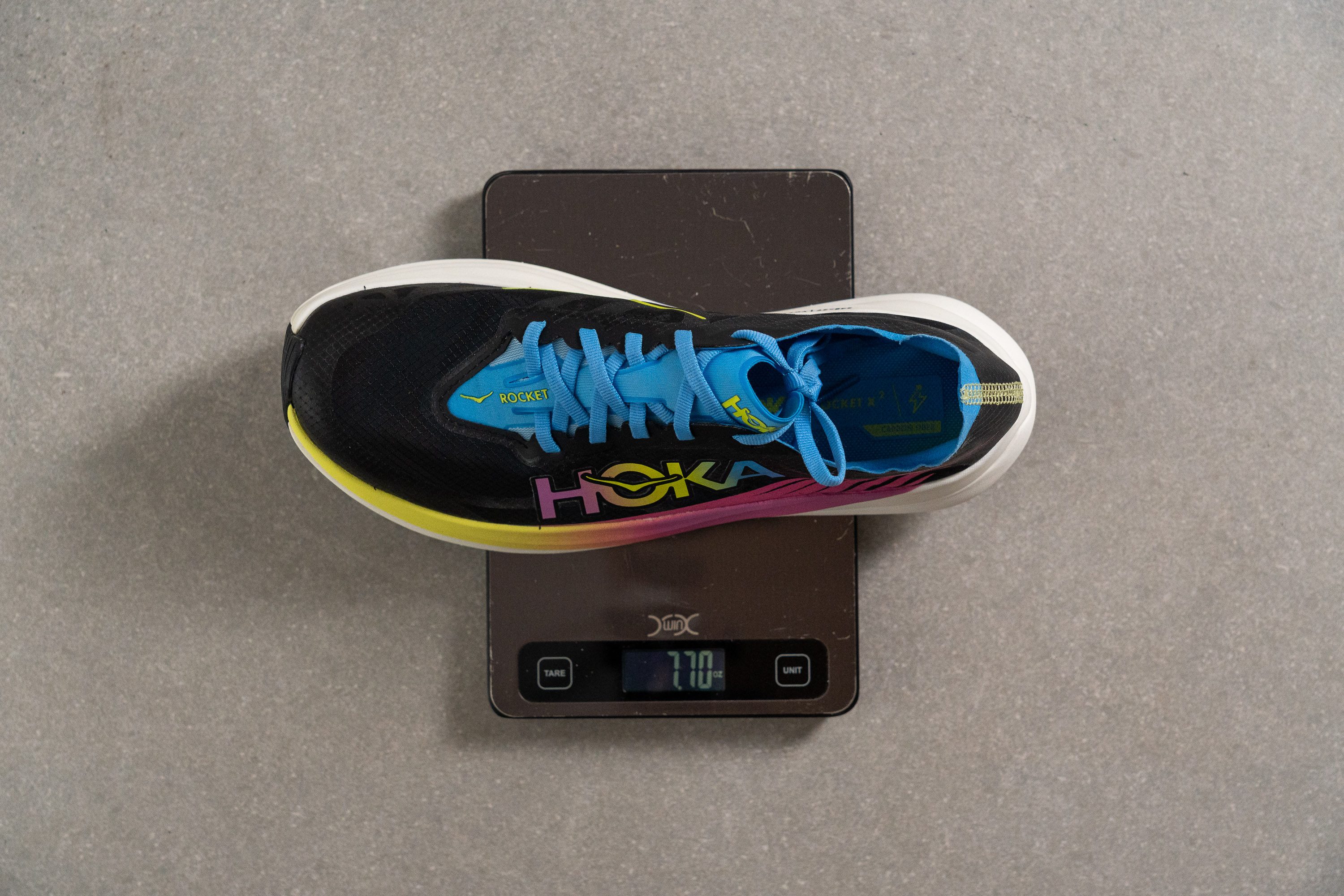
| Hoka Rocket X 2 | 7.69 oz (218g) |
| Average | 9.35 oz (265g) |
Breathability
While the Rocket X 2 scored a 4/5—a solid score by any standard—we had hoped for a perfect 5/5. As Hoka's premier marathon shoe, and priced at £250, it should stand out in every performance category, including airflow.
At first glance, we genuinely believed we were looking at an ultra-breathable shoe. This impression was reinforced by a light test where parts of the upper seemed almost transparent. It was an effect we hadn't encountered before!
Even without the light, we could easily see our hand through the other side—a rarity in our lab tests.
Puzzled by this, we turned to our lab's microscope for answers.

We discovered that the Rocket X 2 features an engineered mesh that is denser than the uppers found in other racing shoes. That's the reason why it fails to achieve a 5/5.
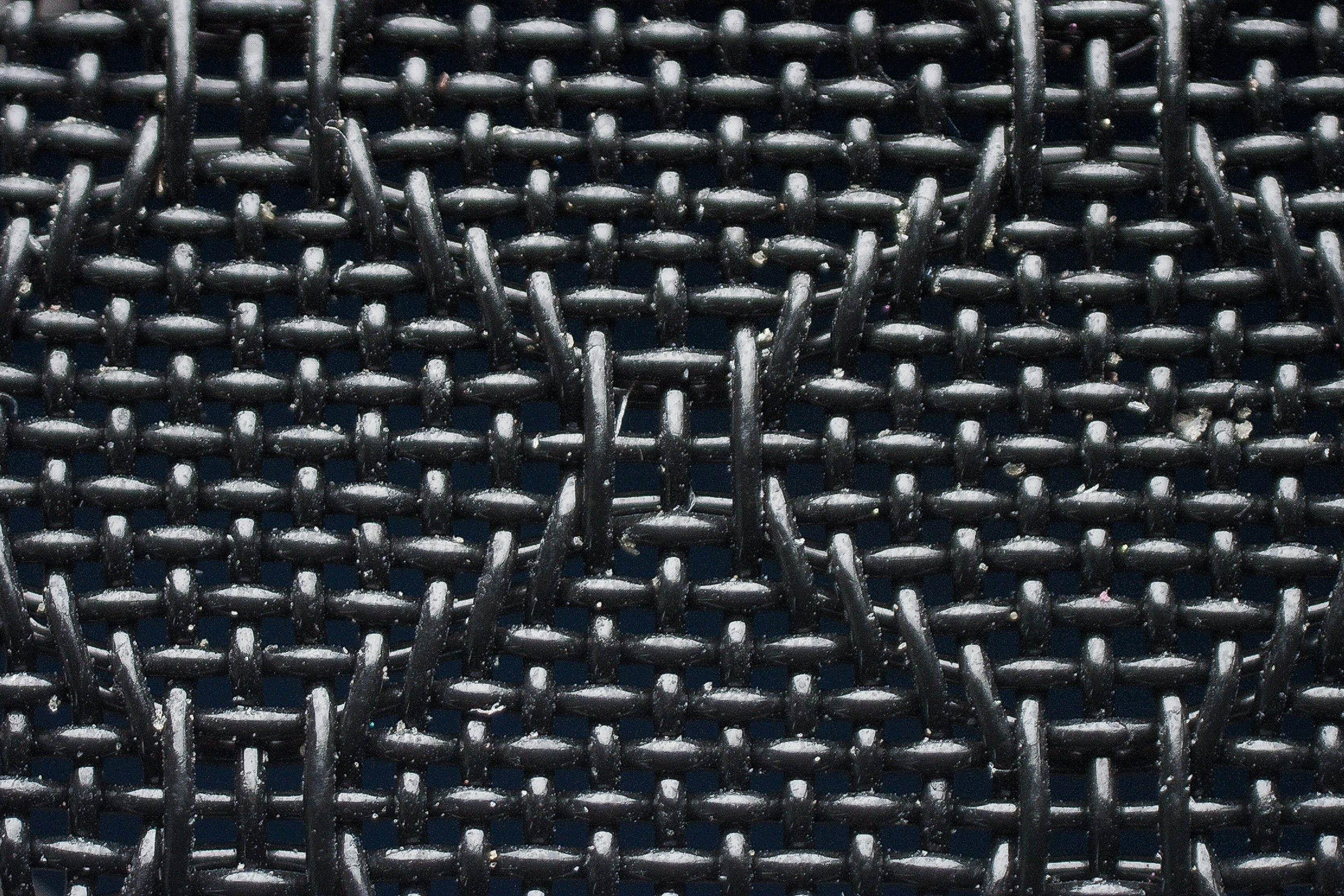
The difference with the Nike Streakfly (5/5 in this test) is notorious.
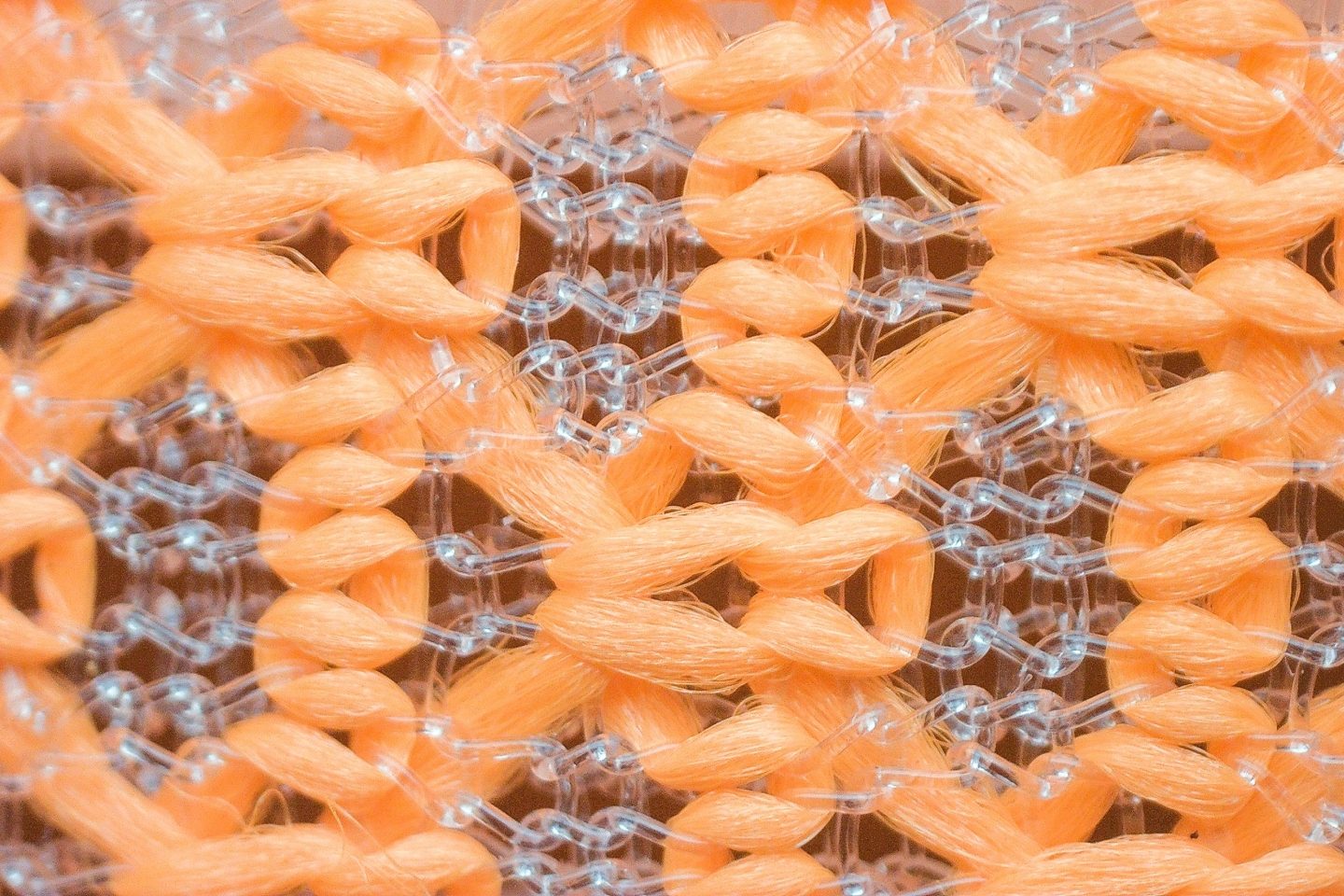
| Hoka Rocket X 2 | 4 |
| Average | 3.8 |
Durability
Toebox durability
You might think that sacrificing top-tier breathability would mean the Rocket X 2 excels in durability. Unfortunately, that's not the case.
After conducting our dremel test in the lab, we discovered that the Rocket X 2 earned the lowest possible score. This low durability score, however, is typical for racing shoes except for some outliers like the Nike Alphafly 2.
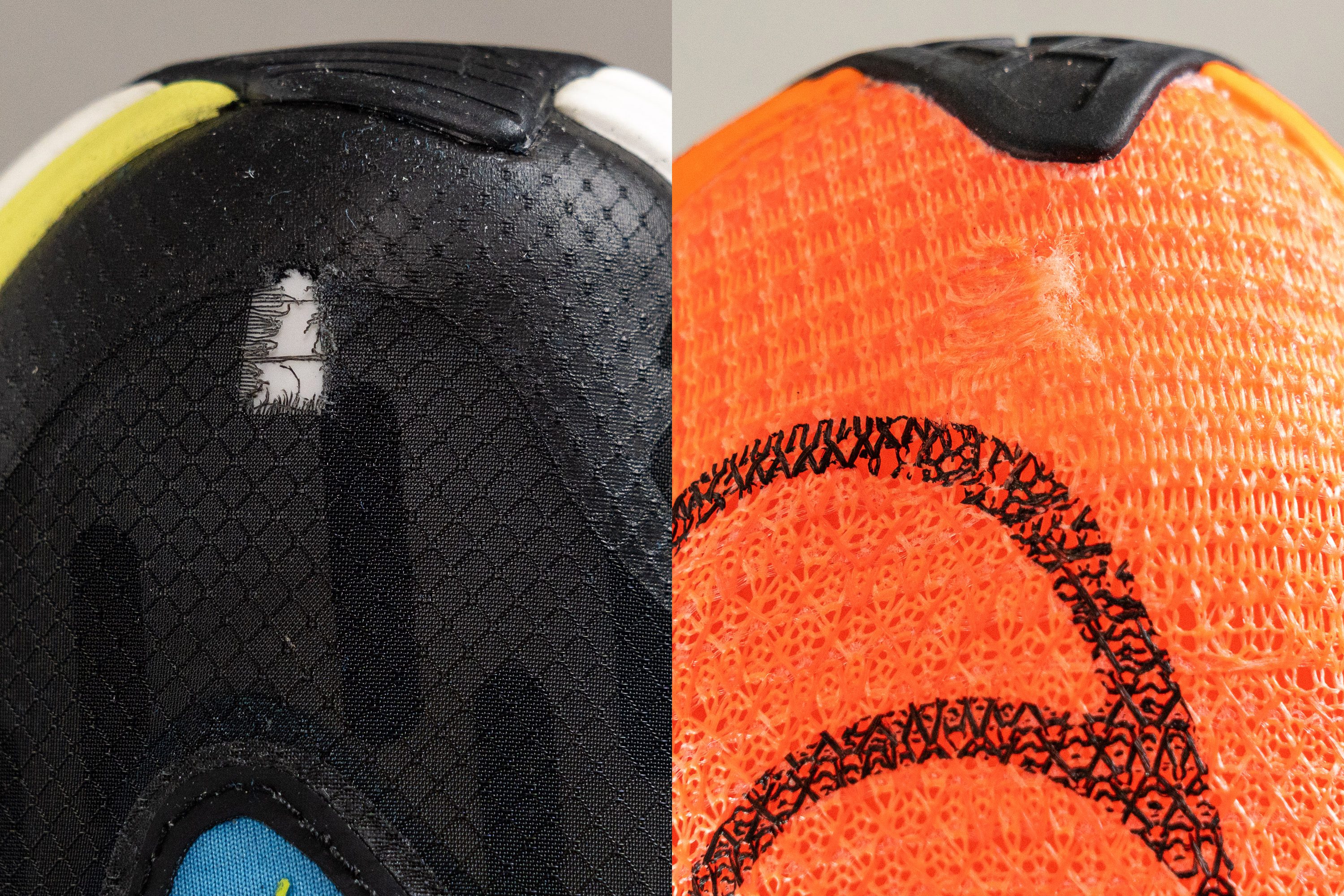
| Hoka Rocket X 2 | 1 |
| Average | 2.6 |
Heel padding durability
The story changes dramatically when we look at the heel. It's remarkably durable (5/5) and there's a good reason behind this.
While daily trainers typically feature a lot of padding and softer materials in the heel for comfort, racing shoes actually go the opposite way.
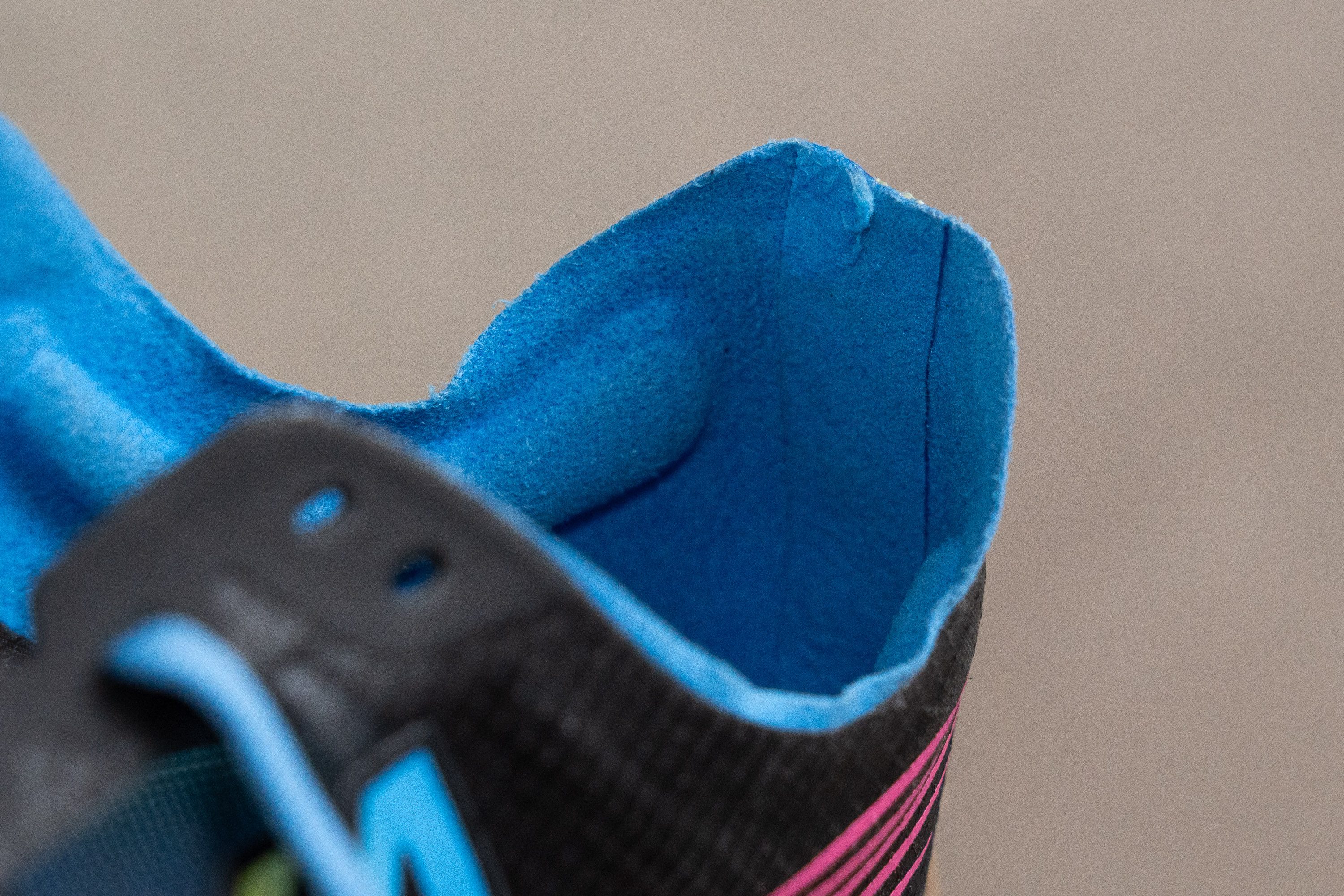
| Hoka Rocket X 2 | 5 |
| Average | 3.3 |
Outsole hardness
The rubber in the outsole of the Rocket v2 is notably hard for a racing-focused shoe.
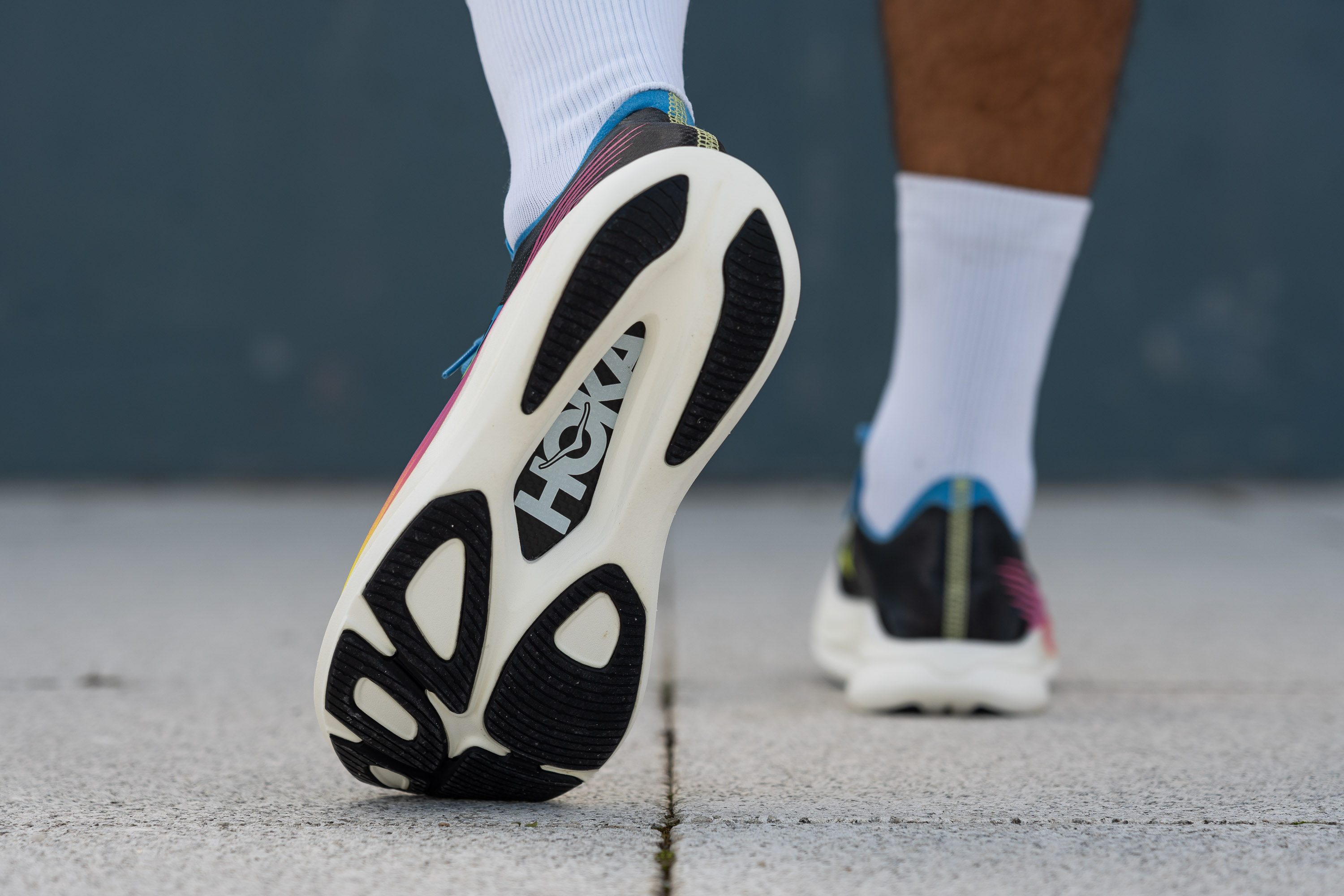
Typically, we find that softer rubber offers better grip. Yet, this shoe measures in at 81.6 HC—similar to what we see in daily trainers and it remains impressively grippy in both dry and wet conditions.
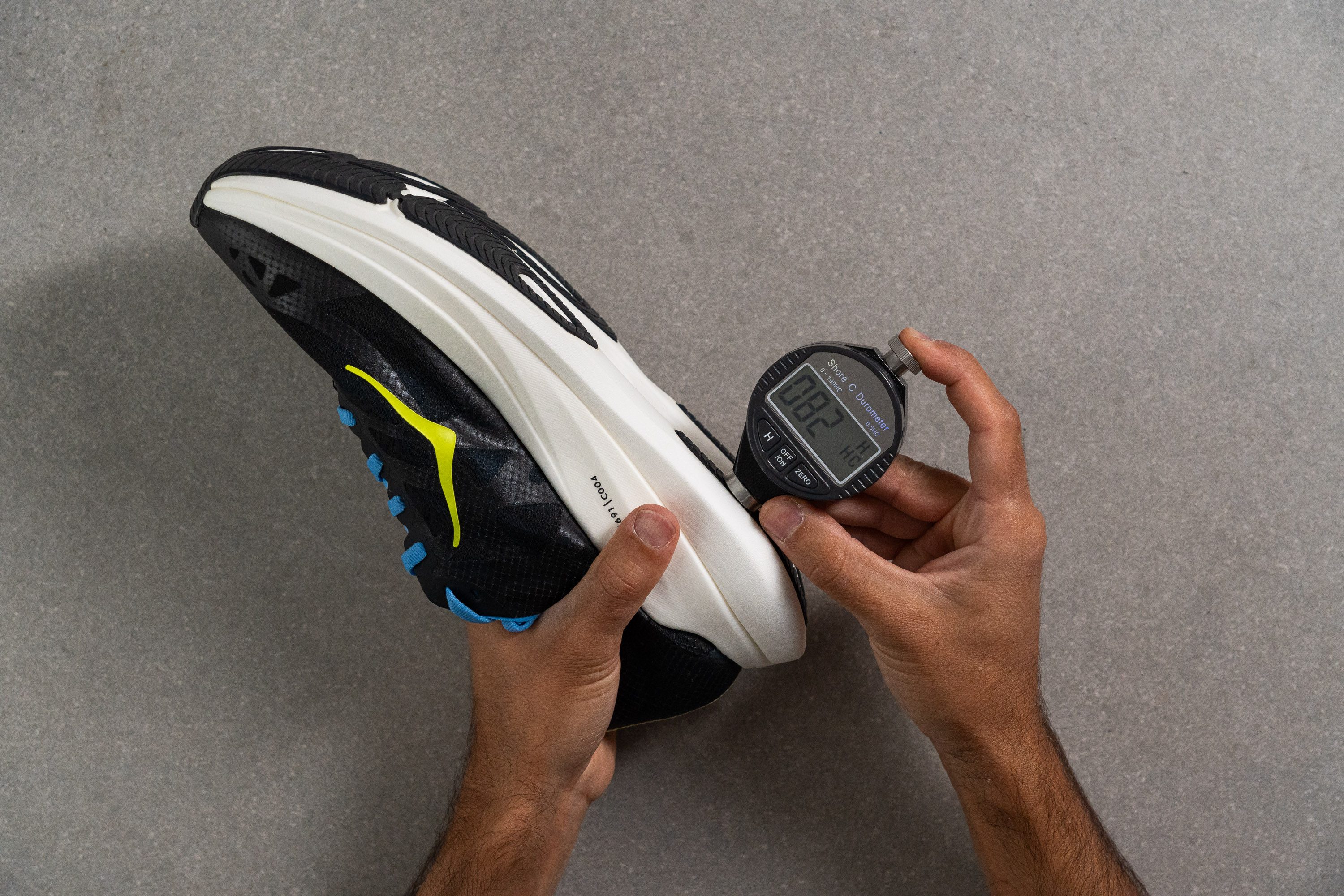
| Hoka Rocket X 2 | 81.6 HC |
| Average | 79.5 HC |
Outsole durability
We were eager to see if our initial thoughts on durability held up during the dremel test.
We're pleased to share that we measured a tiny 0.5 mm indentation in the rubber.
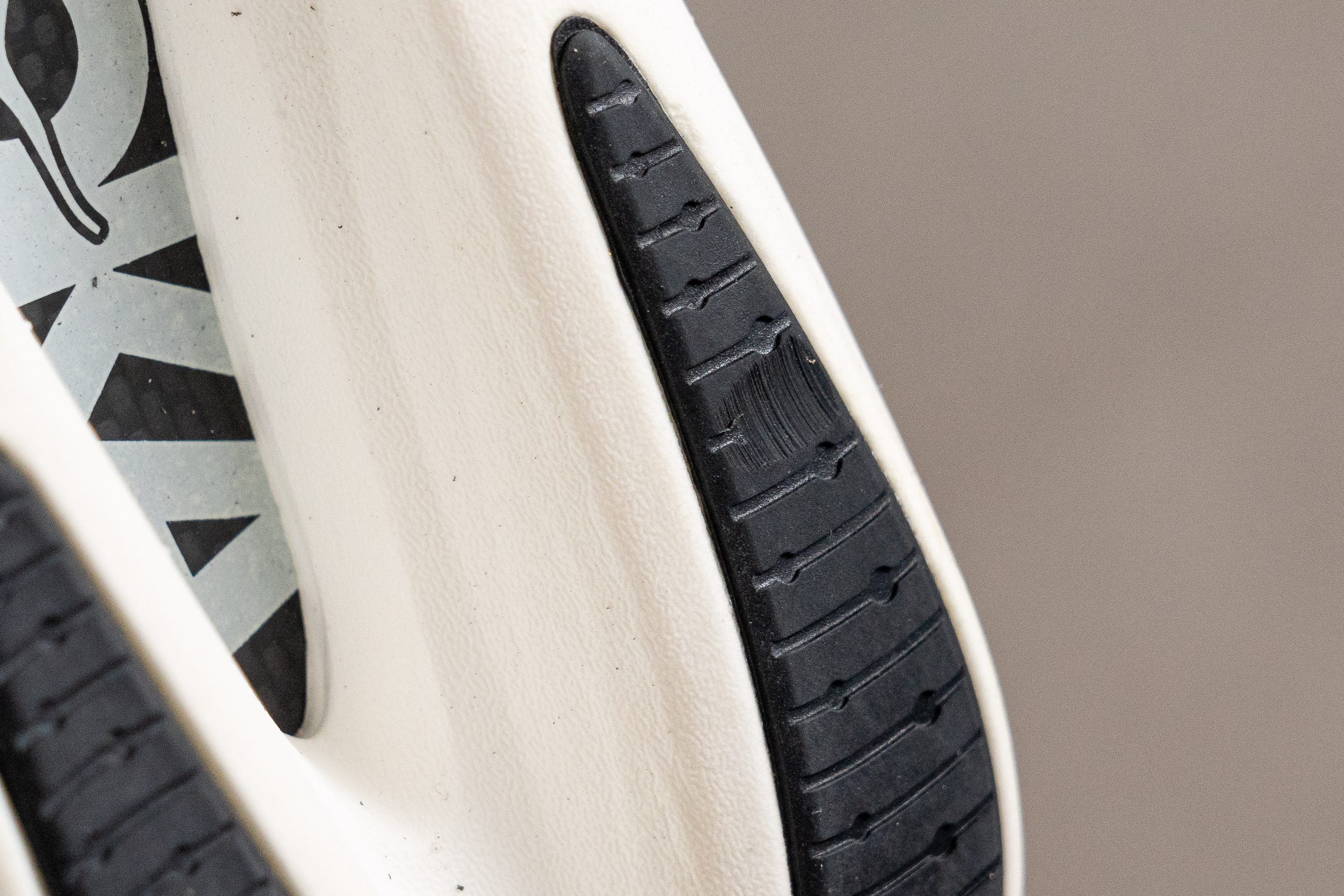
| Hoka Rocket X 2 | 0.5 mm |
| Average | 1.1 mm |
Outsole thickness
After conducting the two previous tests and now discovering a thickness of 2.0 mm, we confidently believe that this shoe will effortlessly serve runners for an impressive 200-300 miles without showing significant wear on the outsole.
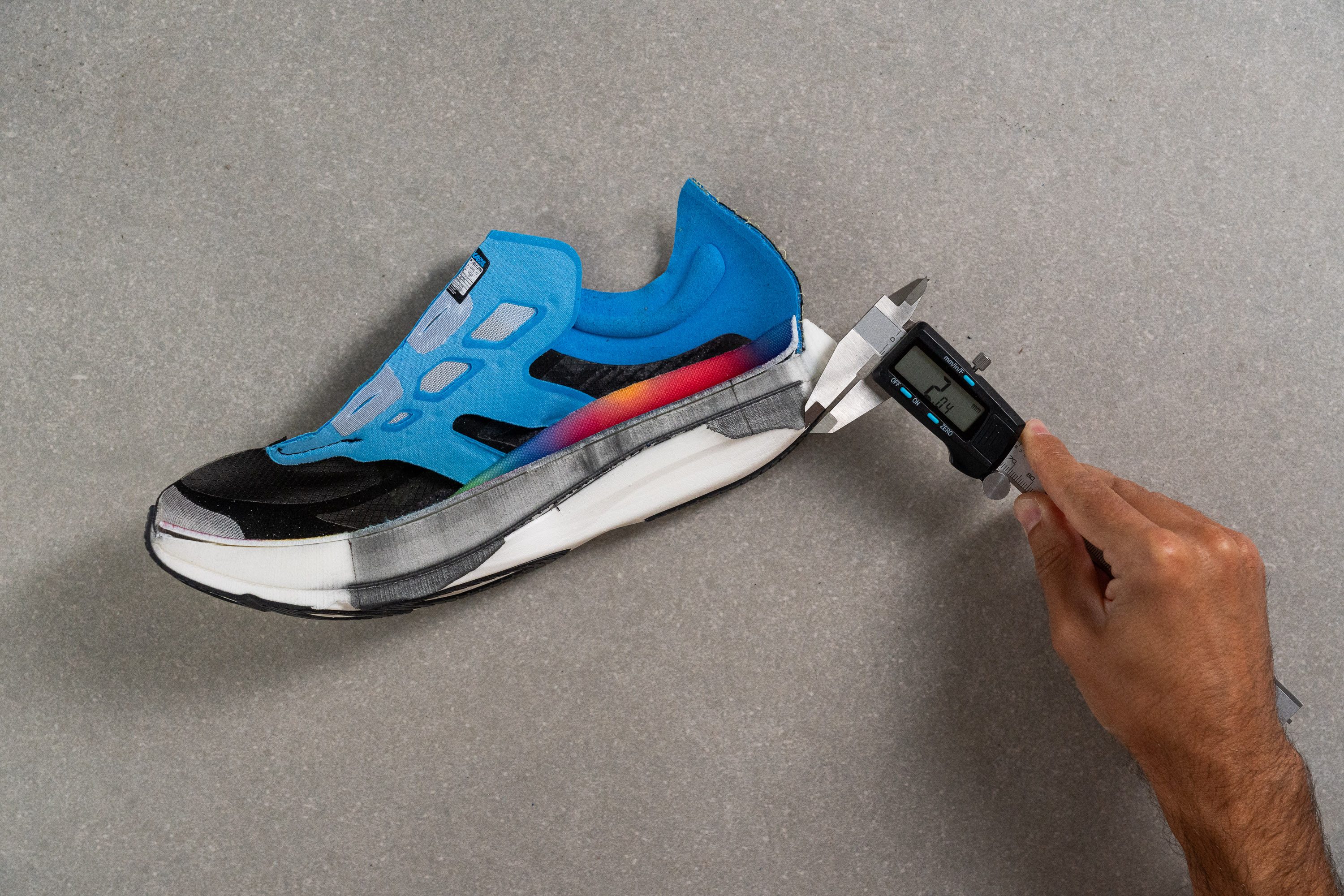
| Hoka Rocket X 2 | 2.0 mm |
| Average | 3.3 mm |
Misc
Reflective elements
Hoka chose not to add reflective elements to the Rocket X 2, and we understand their decision. We mentioned earlier that, for a racing shoe, the Rocket X 2 is a bit on the heavy side.
Adding more weight to a shoe that's mostly going to be used during the day wouldn't be practical.
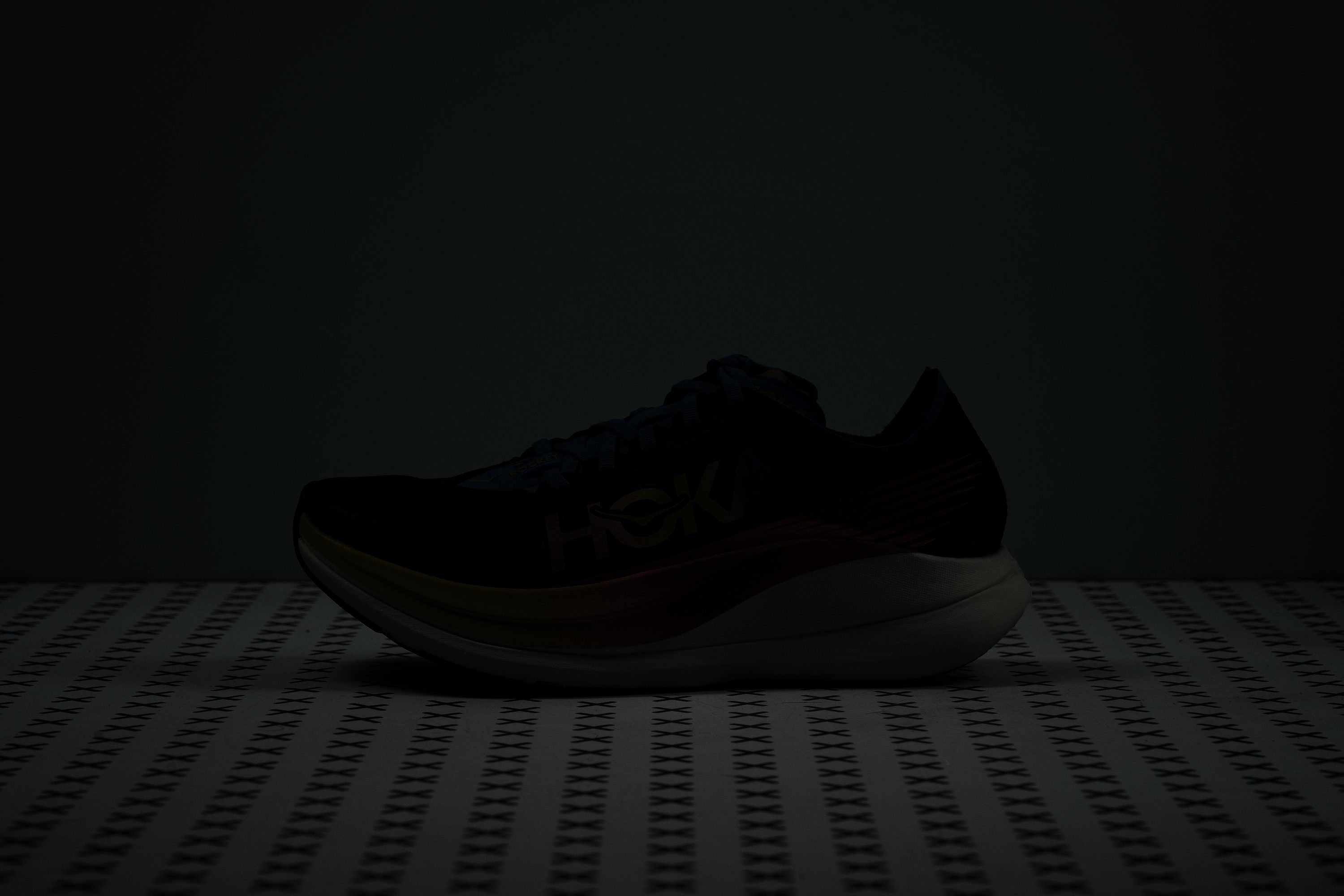
| Hoka Rocket X 2 | No |
Tongue padding
The tongue of the Rocket X 2 is notably slim, especially when stacked up against many other running shoes.
Yet, it feels incredibly plush when compared to the typical racing shoe tongues, which often come in at under 1 mm. In our lab, we found that the 1.9 mm thickness offers a genuinely comfortable feel for this kind of shoe.
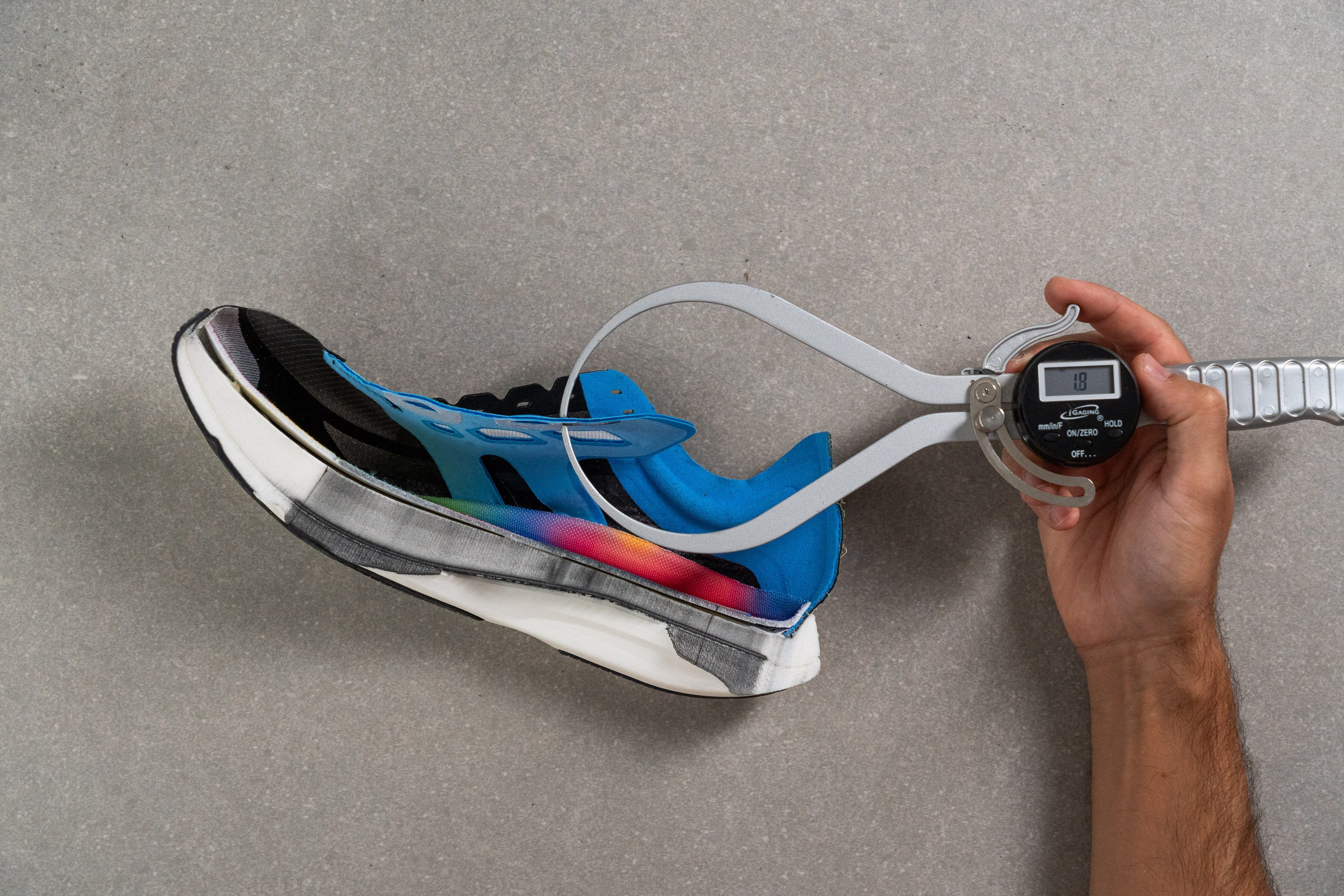
| Hoka Rocket X 2 | 1.9 mm |
| Average | 5.8 mm |
Tongue: gusset type
The tongue of the Rocket X 2 is semi-gusseted, meaning it's partially attached to the sides.
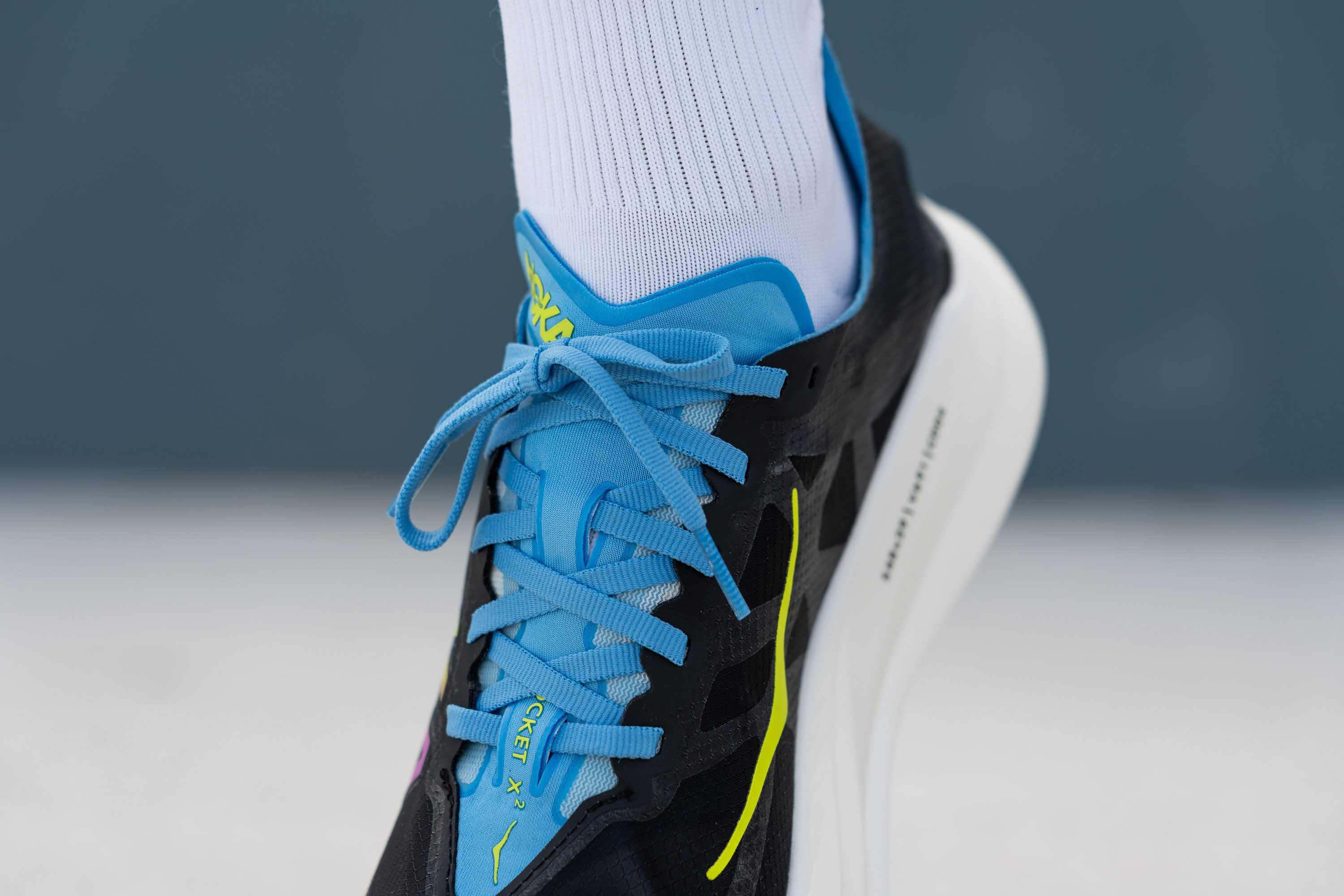
We believe this is an excellent strategy for ensuring a nice lockdown, preventing the annoying tongue shifts that we've observed in racing shoes like the Nike Vaporfly 2.
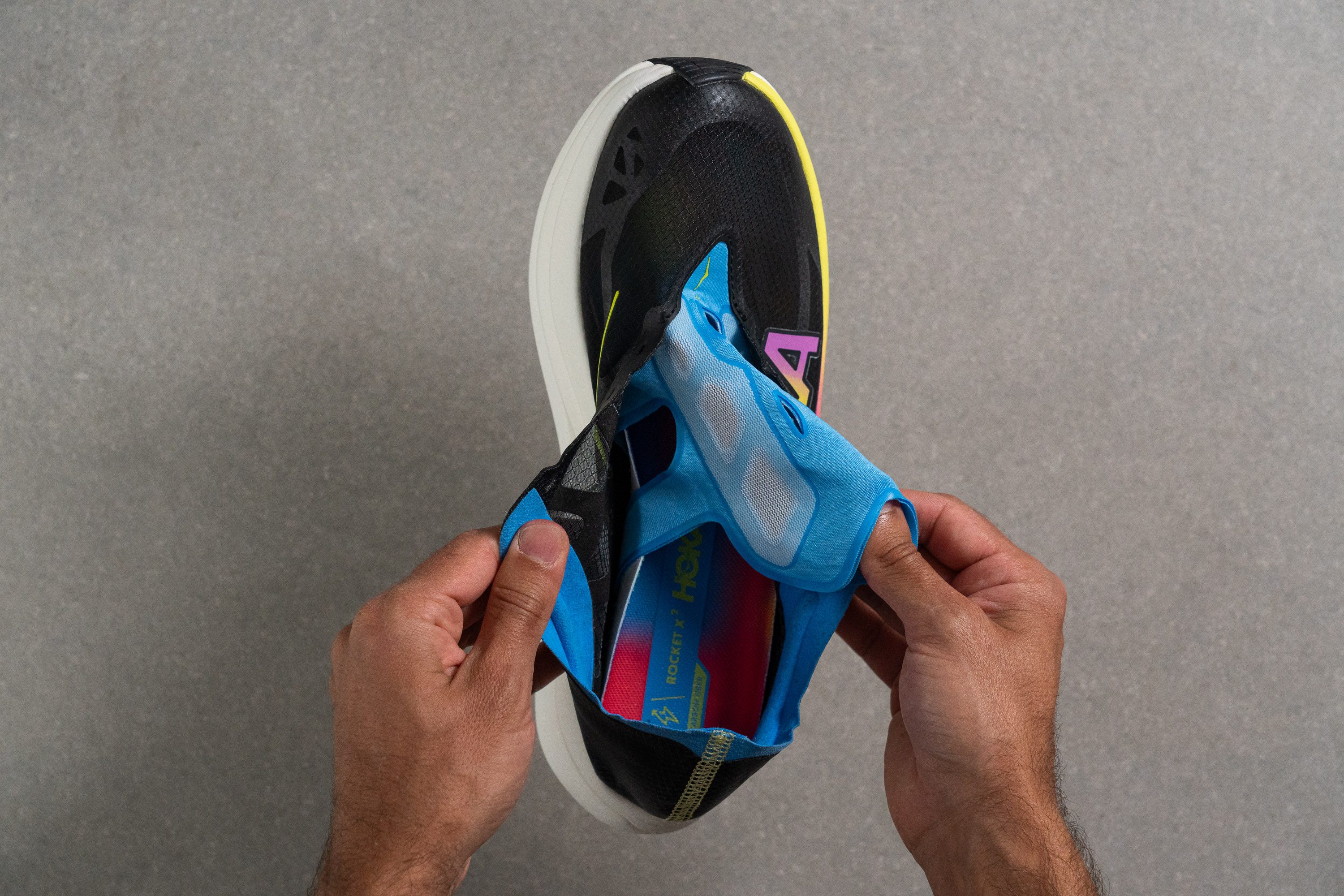
| Hoka Rocket X 2 | Both sides (semi) |
Heel tab
Hoka decided not to include a heel tab on the Rocket X 2 to reduce its weight a bit. We believe that having one could have made slipping the shoe on a bit easier for some.
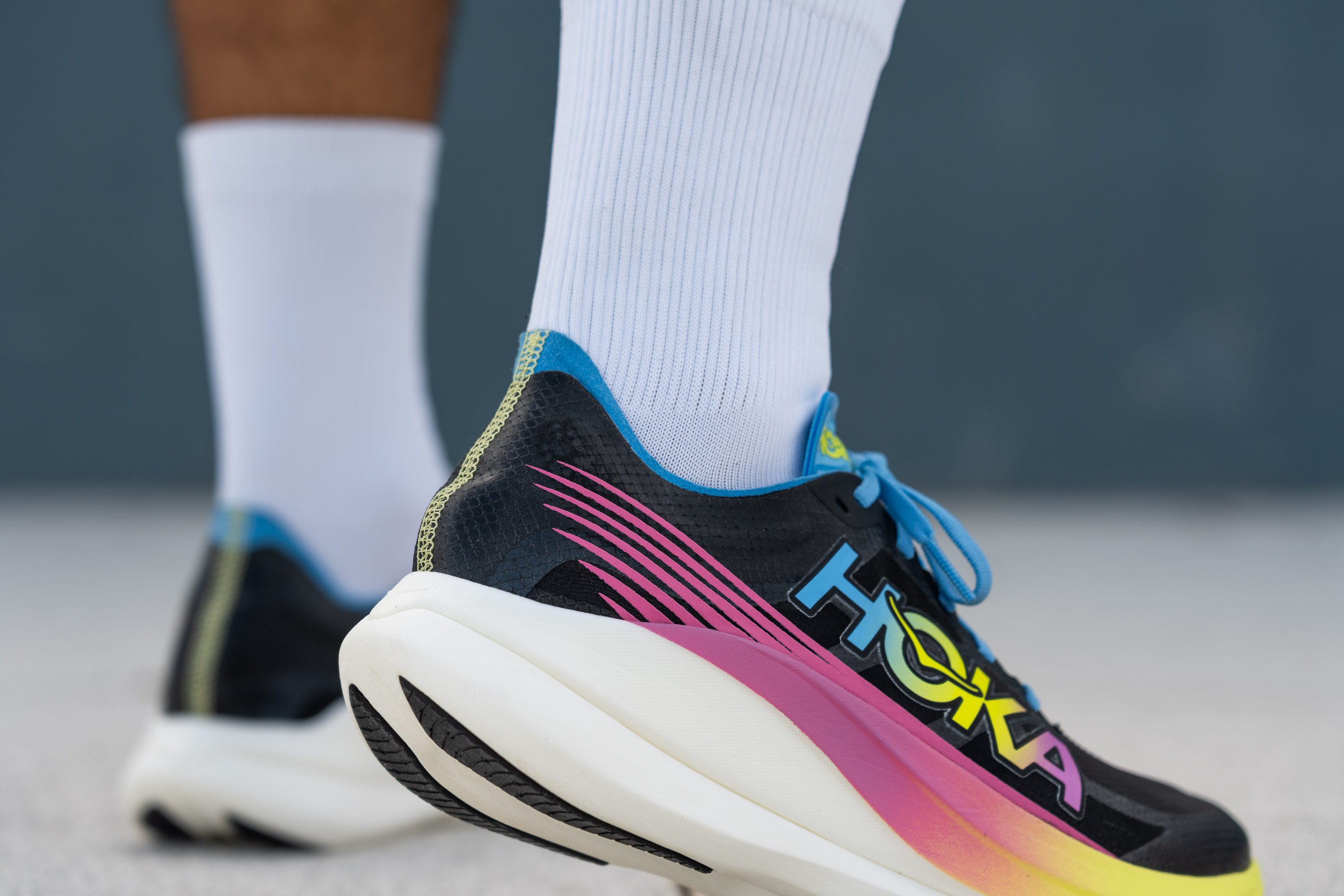
| Hoka Rocket X 2 | None |
Removable insole
The insole of the Rocket X 2 is removable, which we appreciate for a racing shoe. However, if you're thinking of using third-party insoles or orthotics, you might find it challenging.
As we discussed earlier, this shoe is quite narrow, so the internal space is limited.
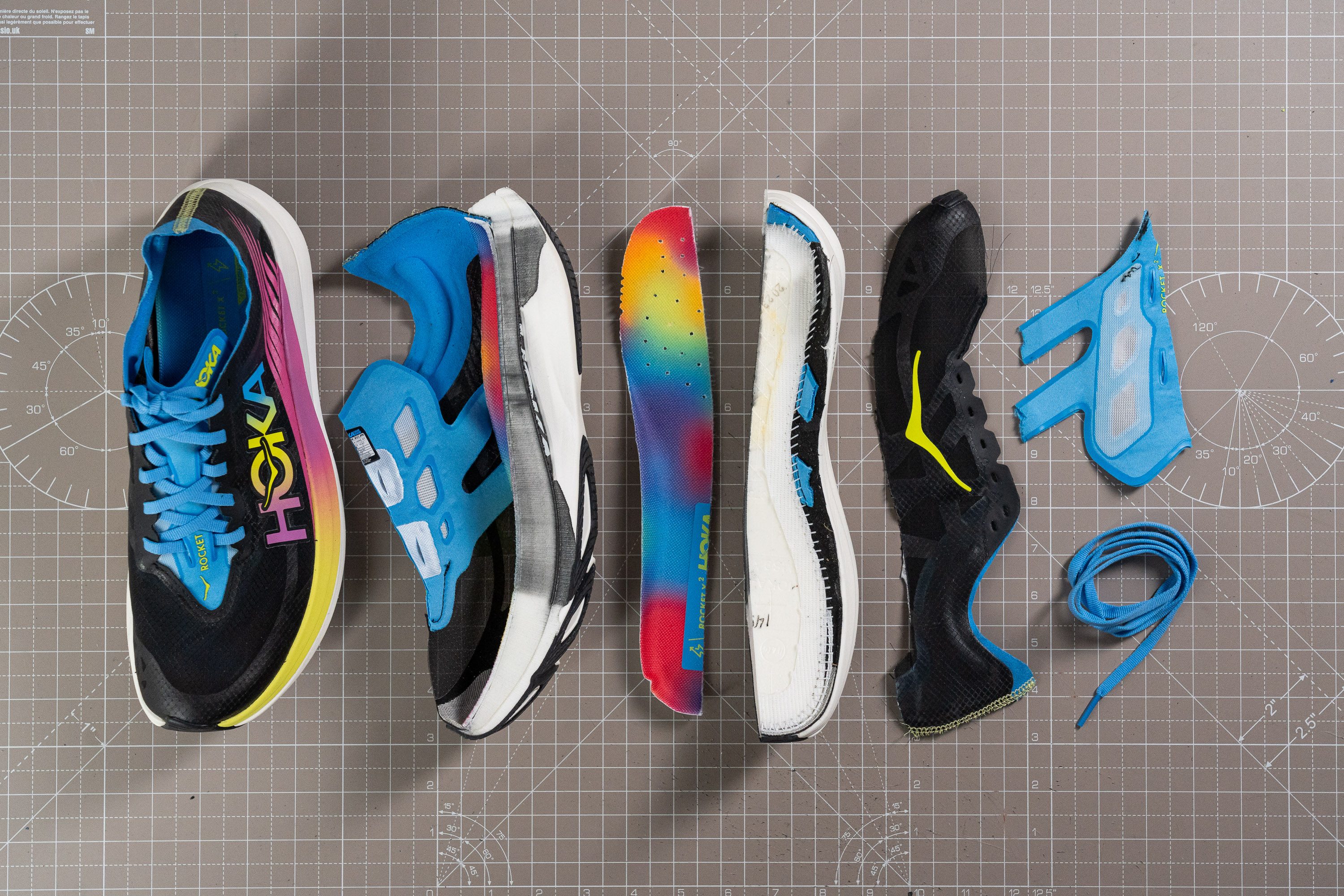
| Hoka Rocket X 2 | Yes |
 Hiring remote: Content writer / review specialist in
Hiring remote: Content writer / review specialist in 
